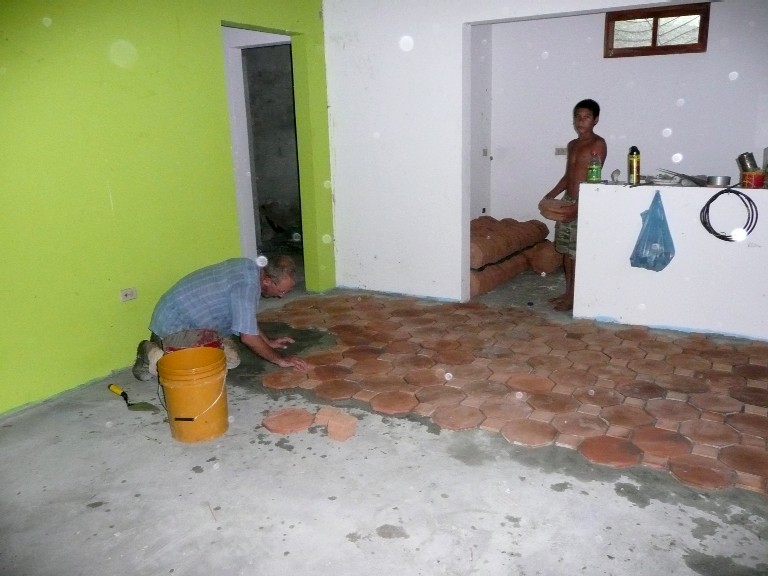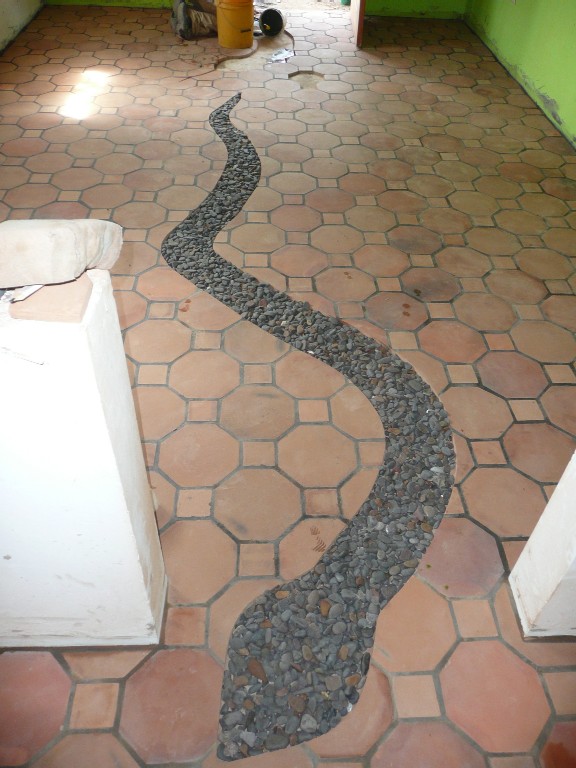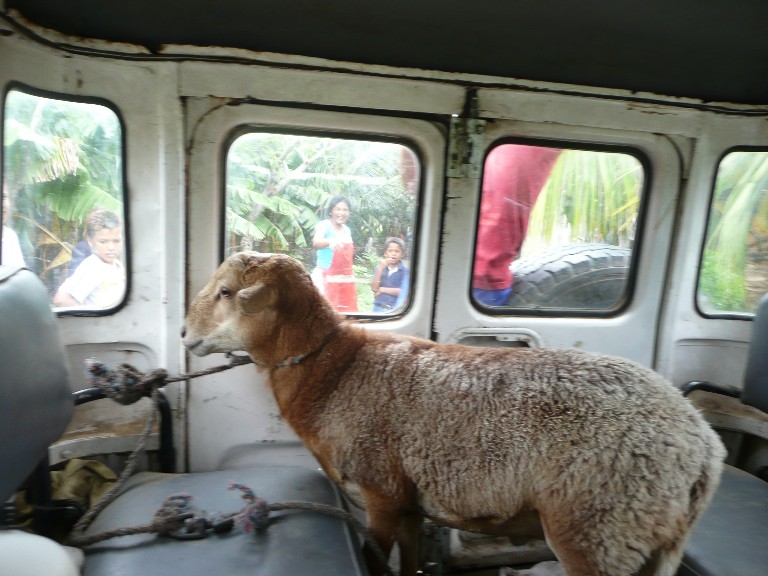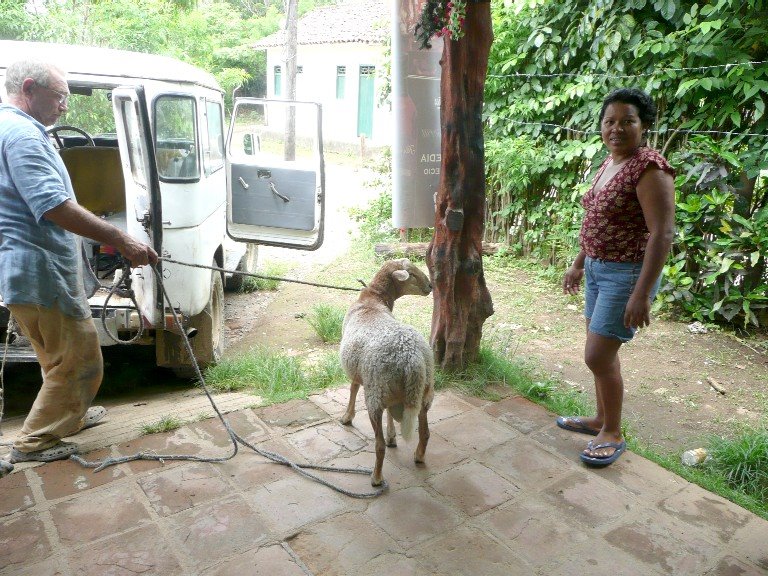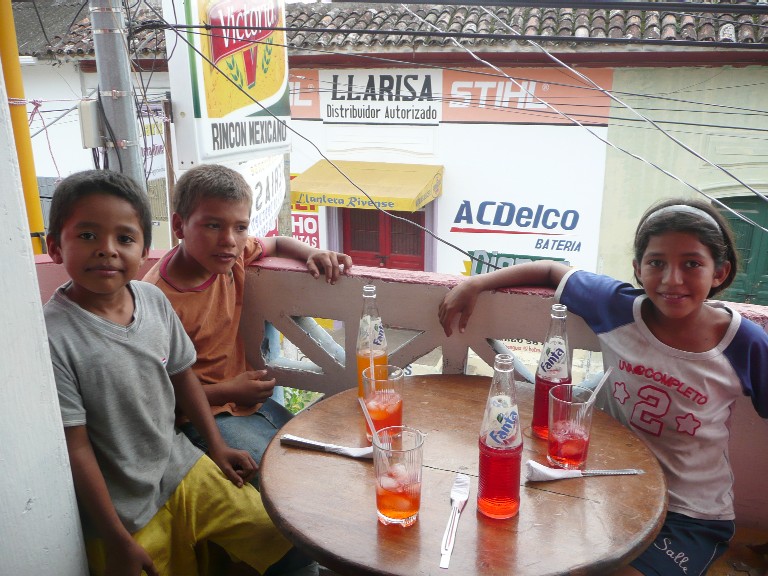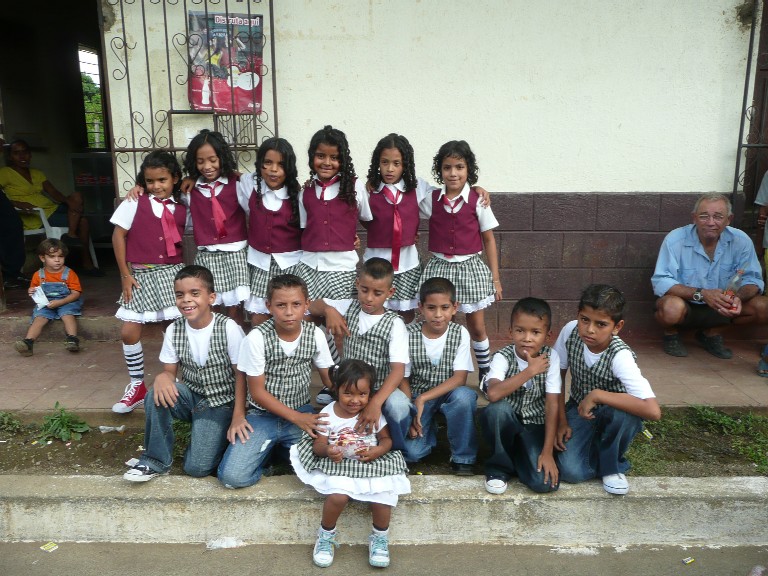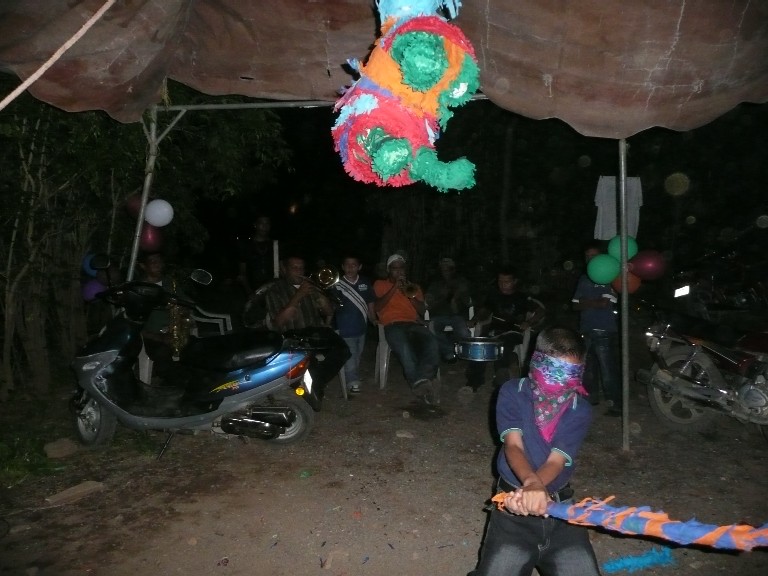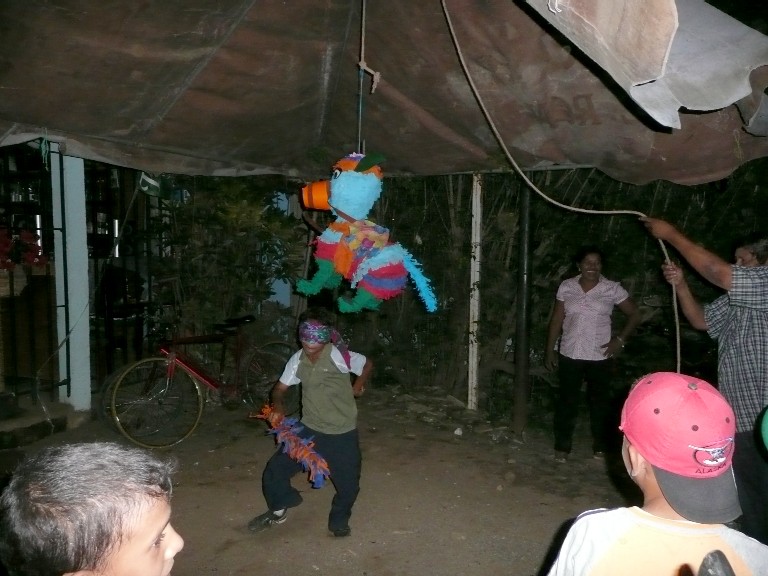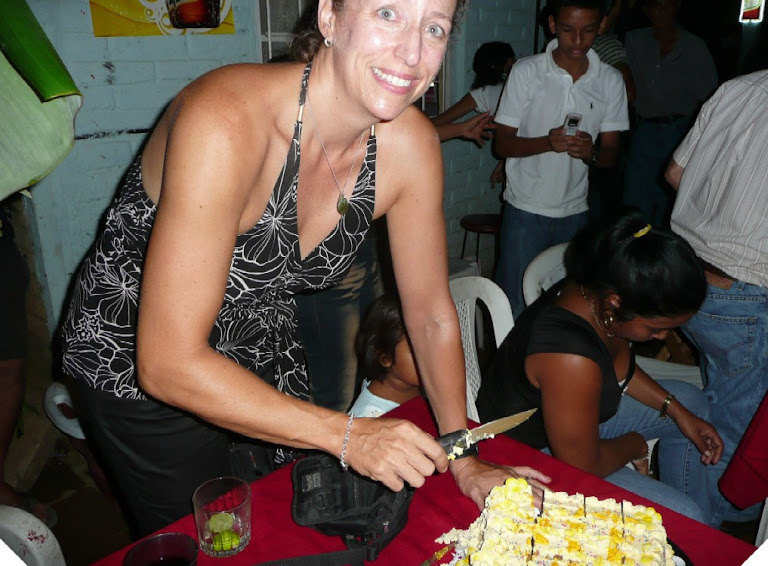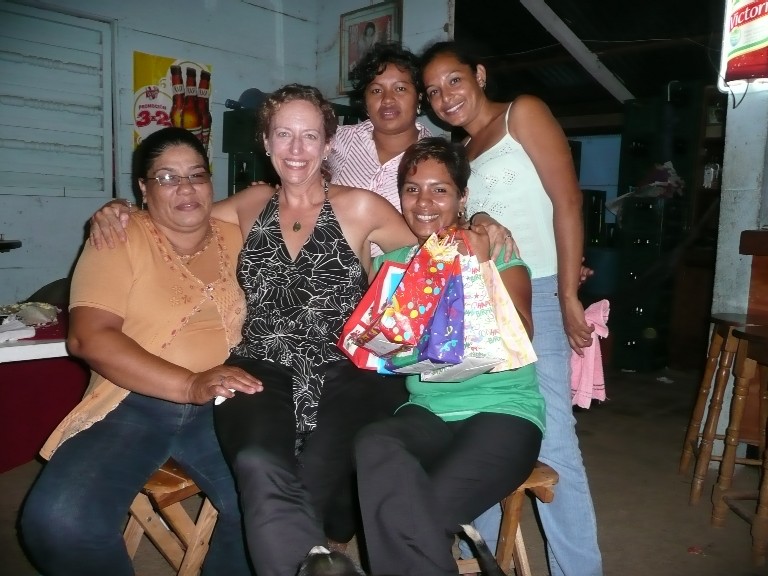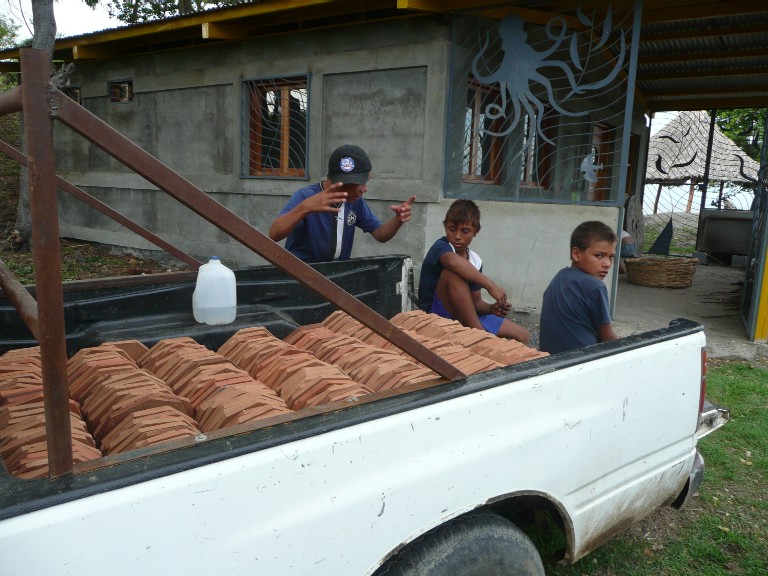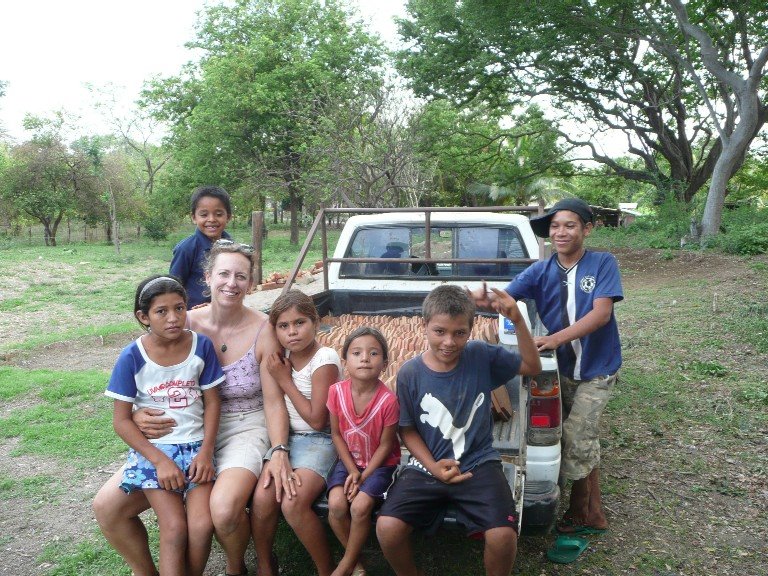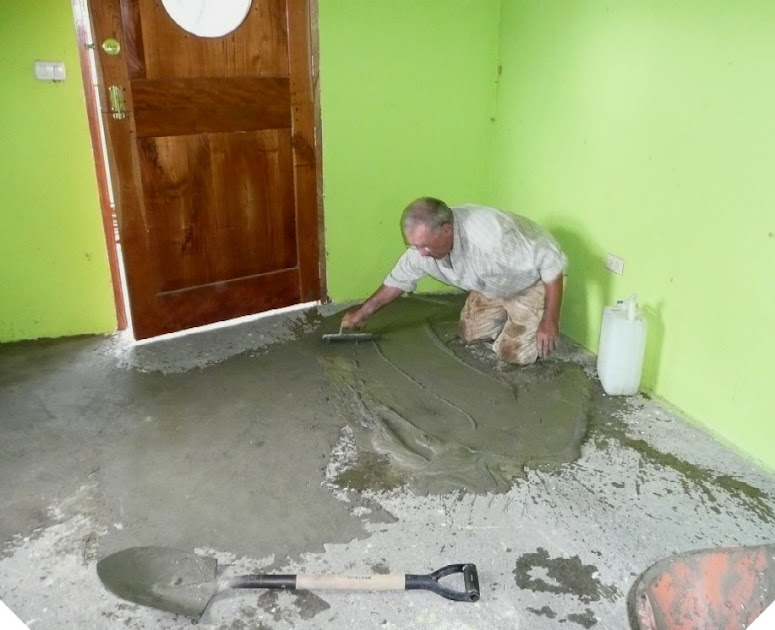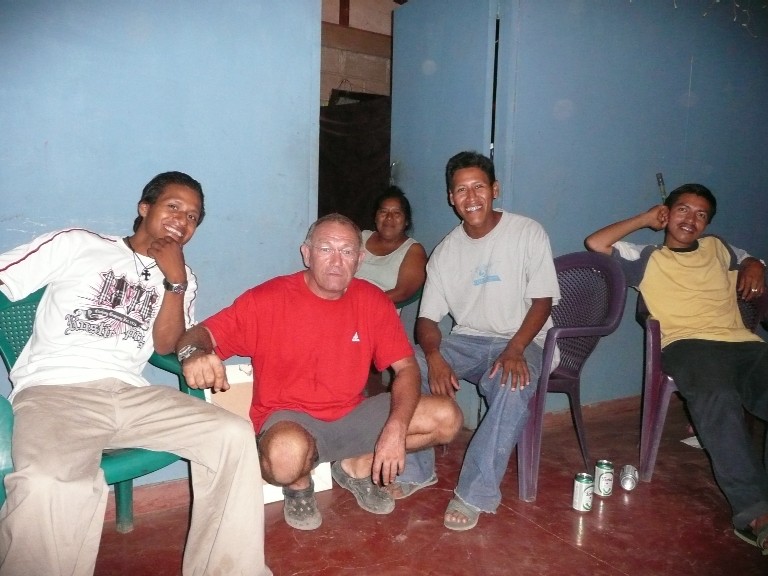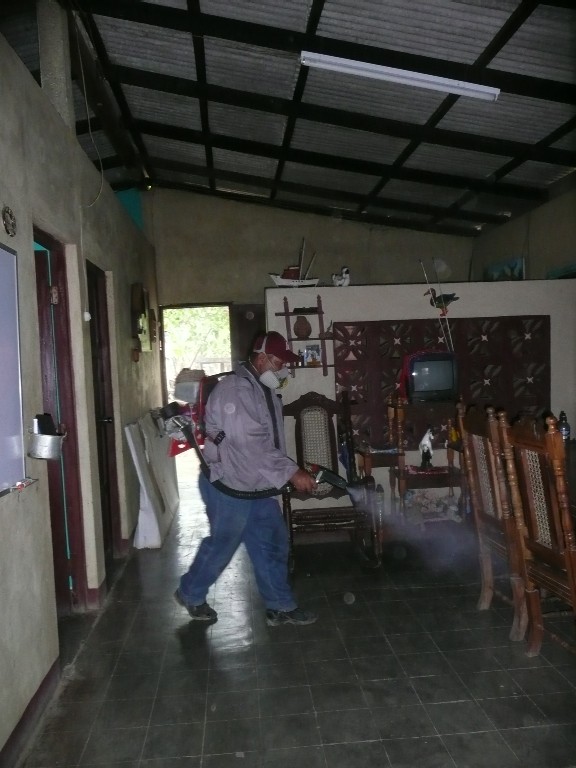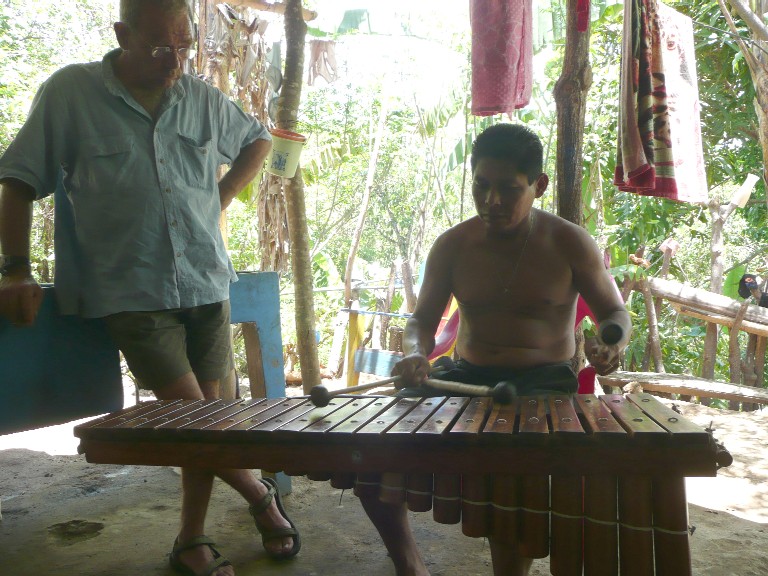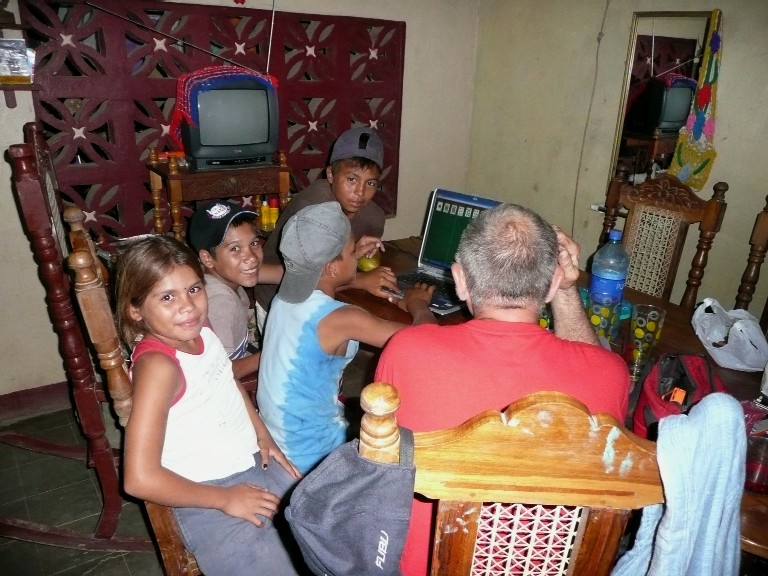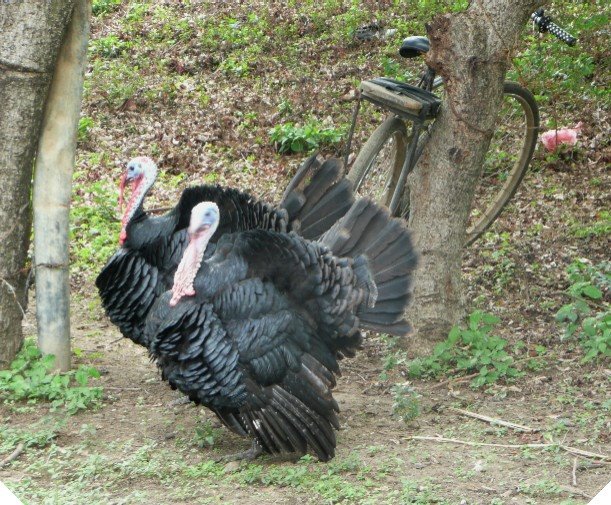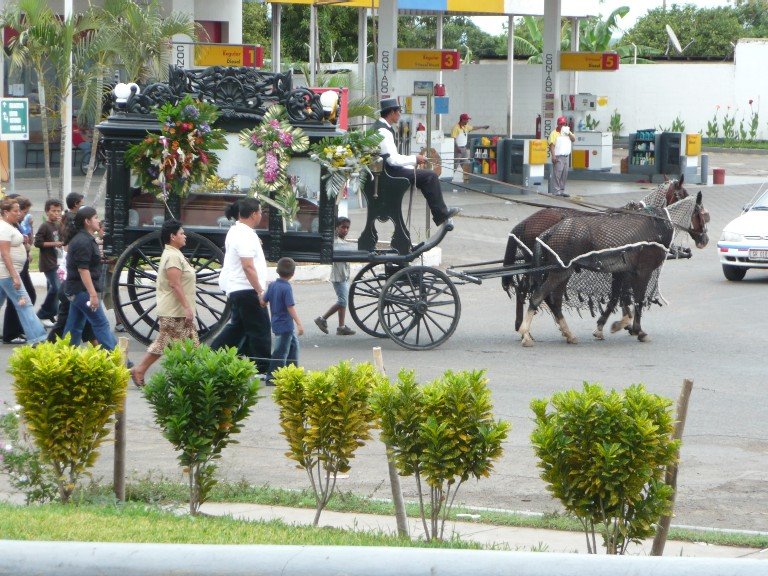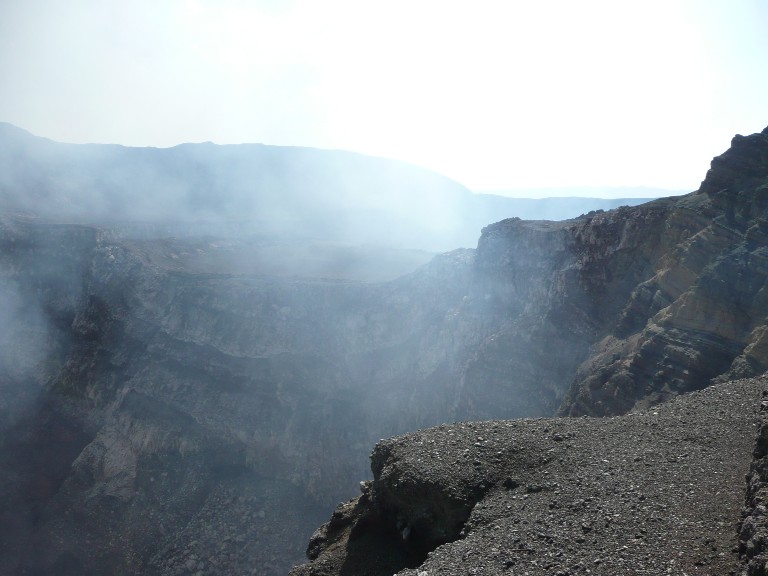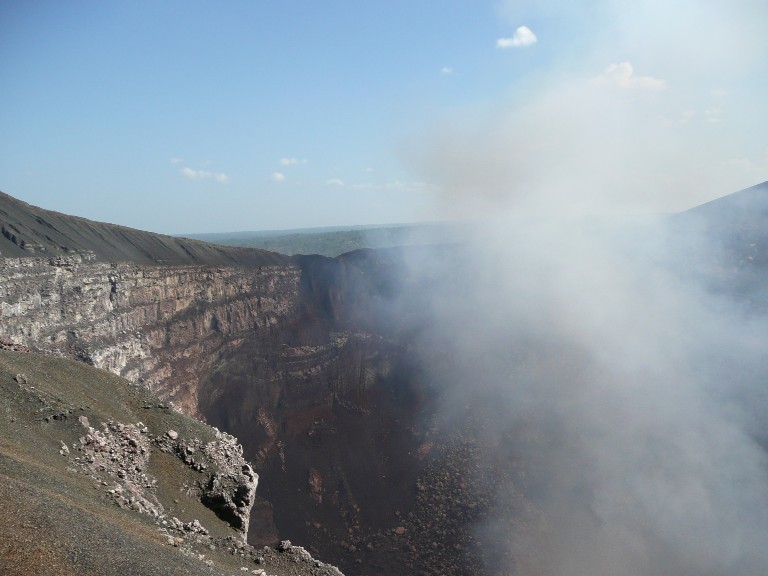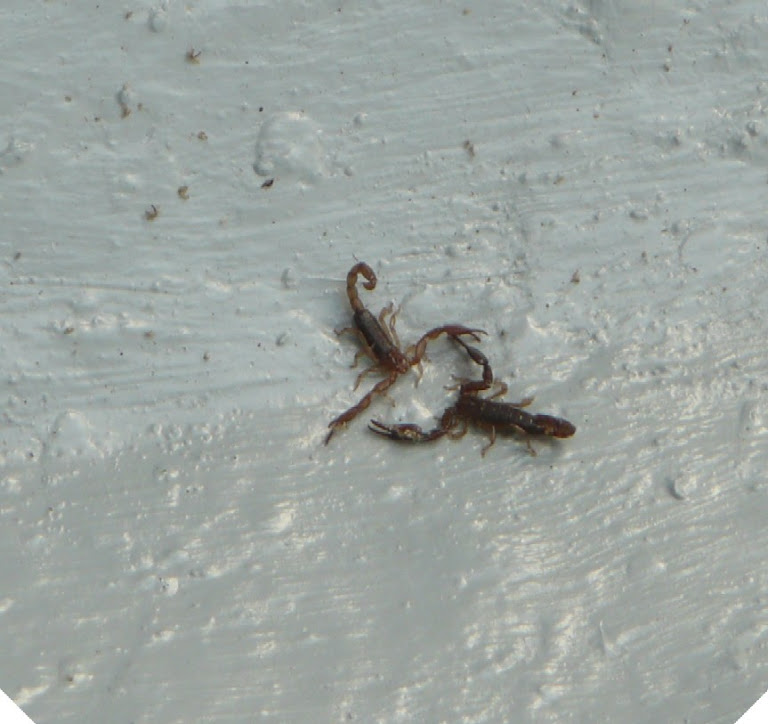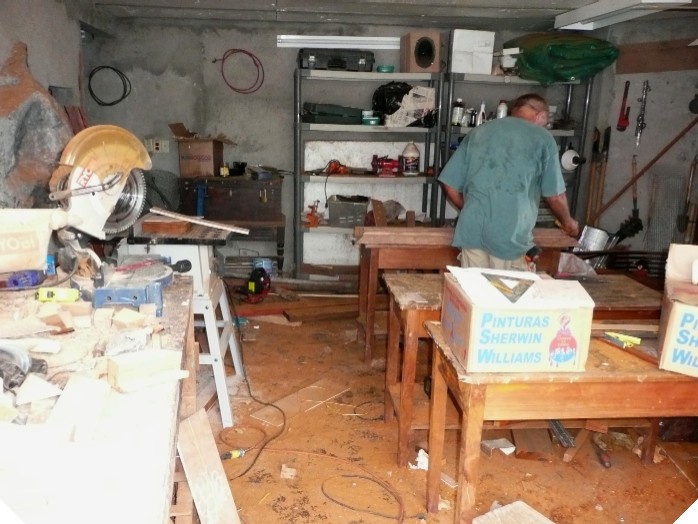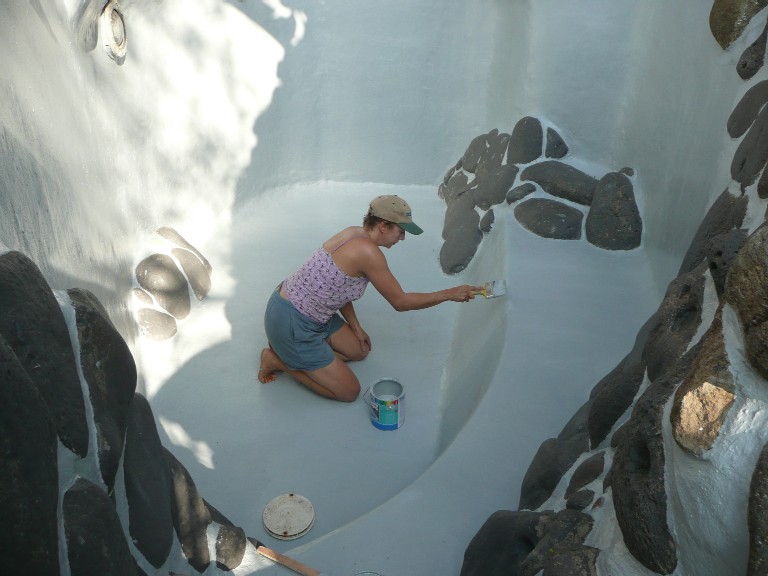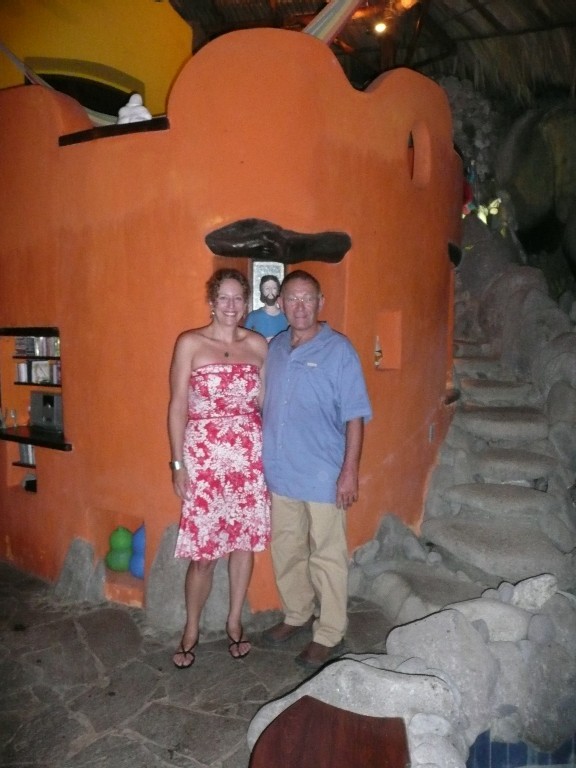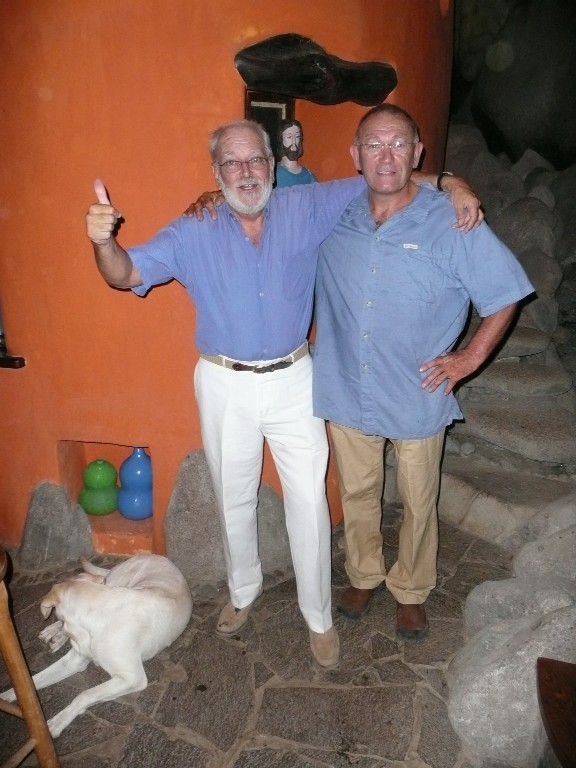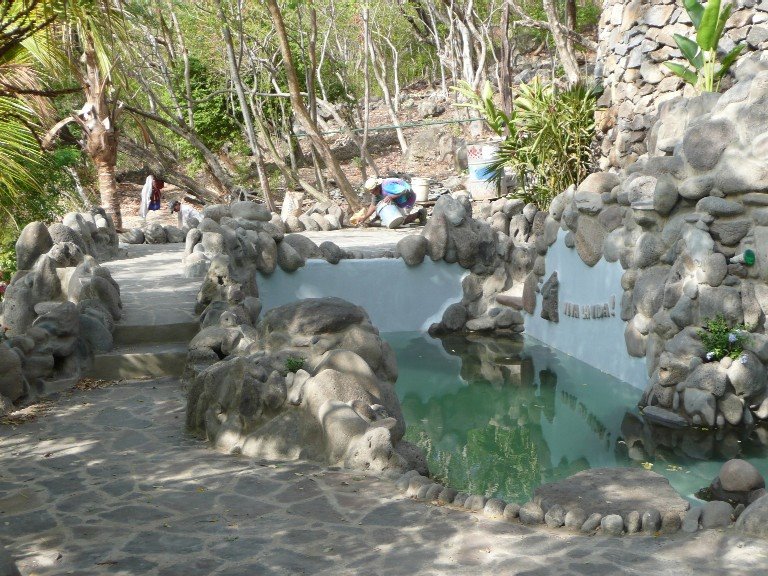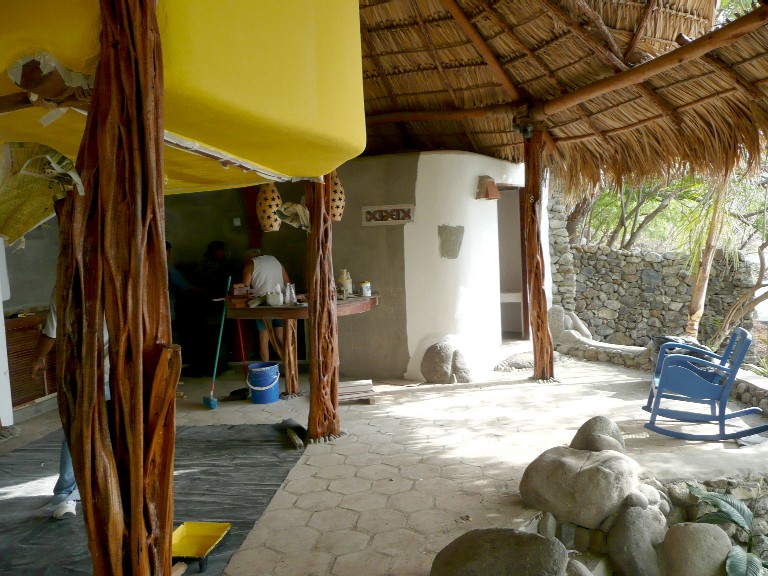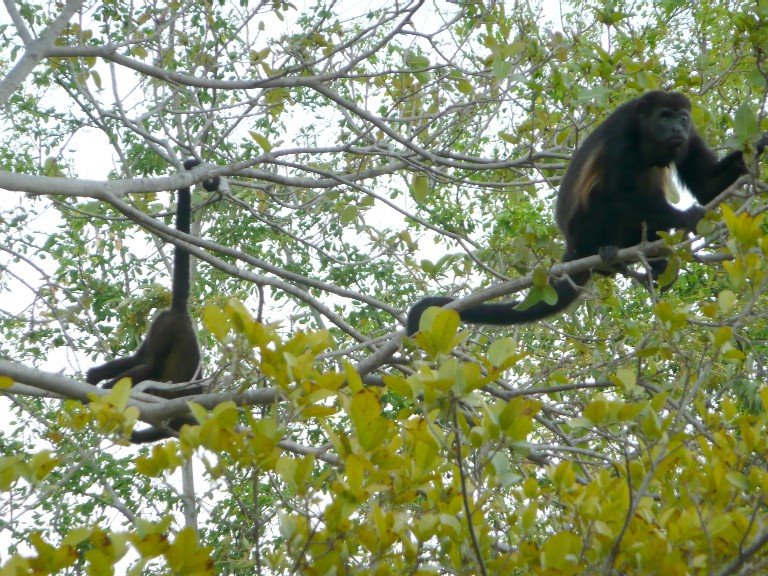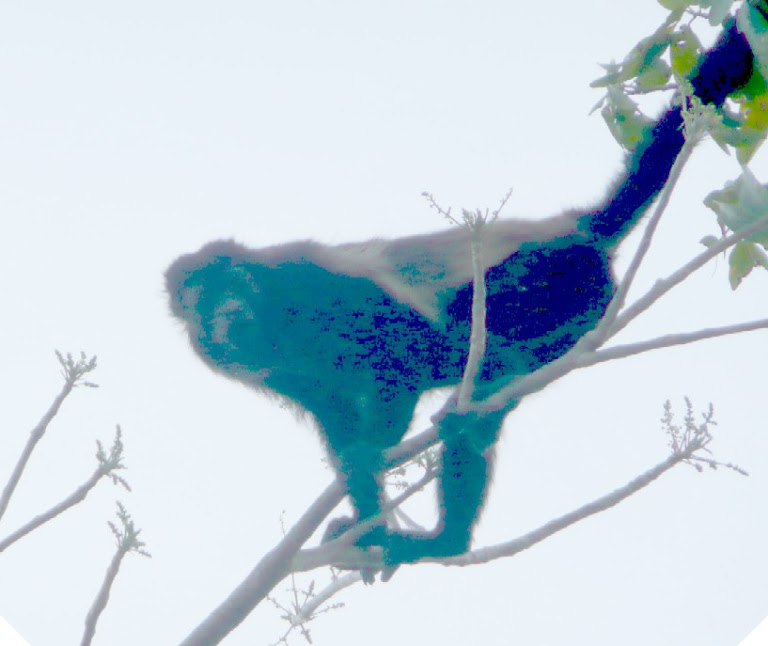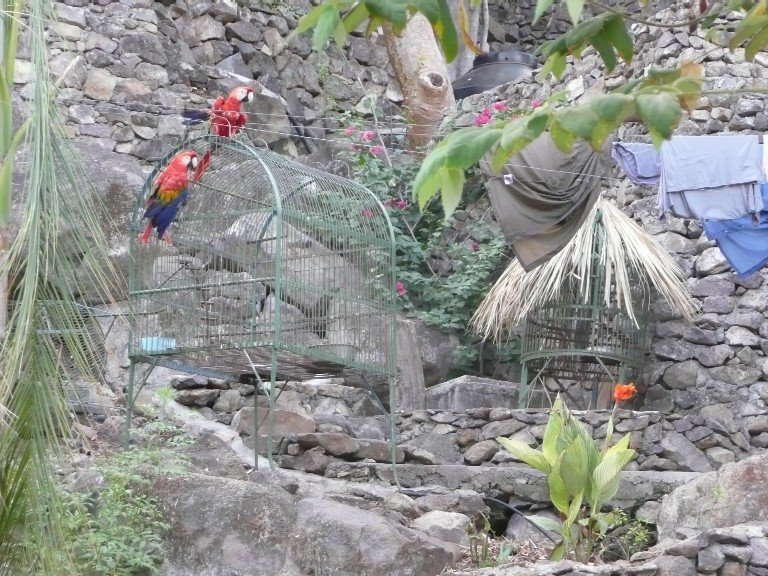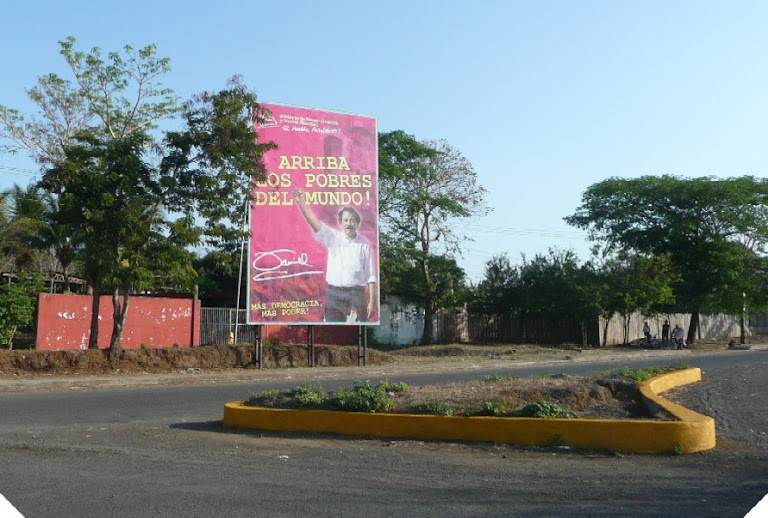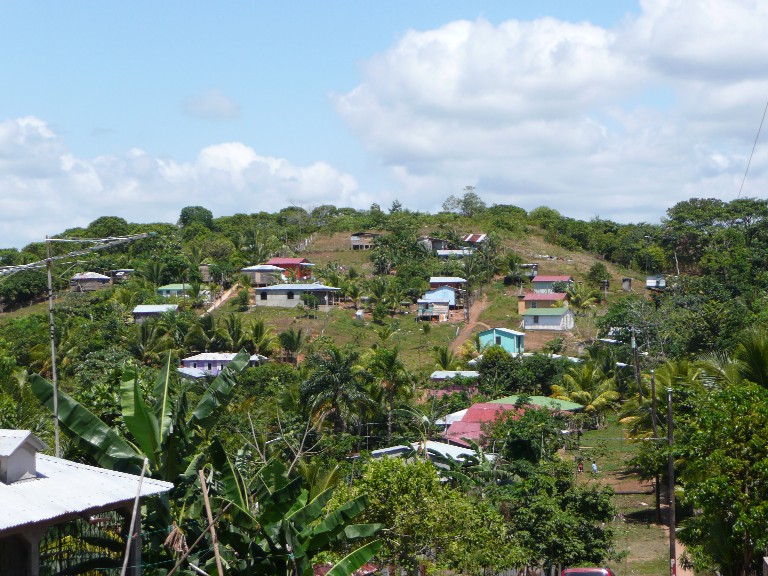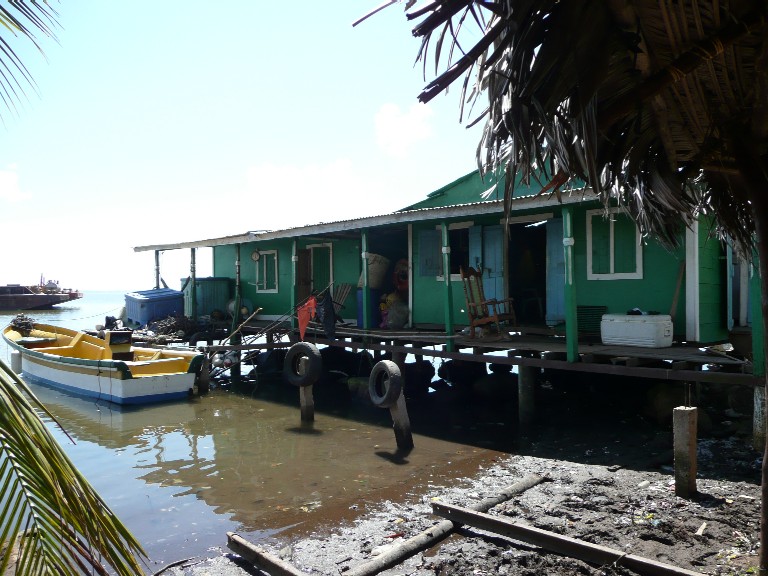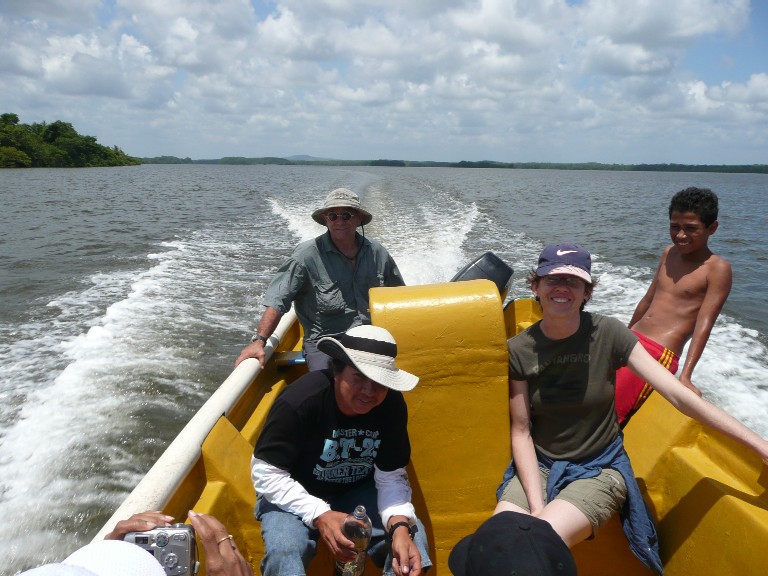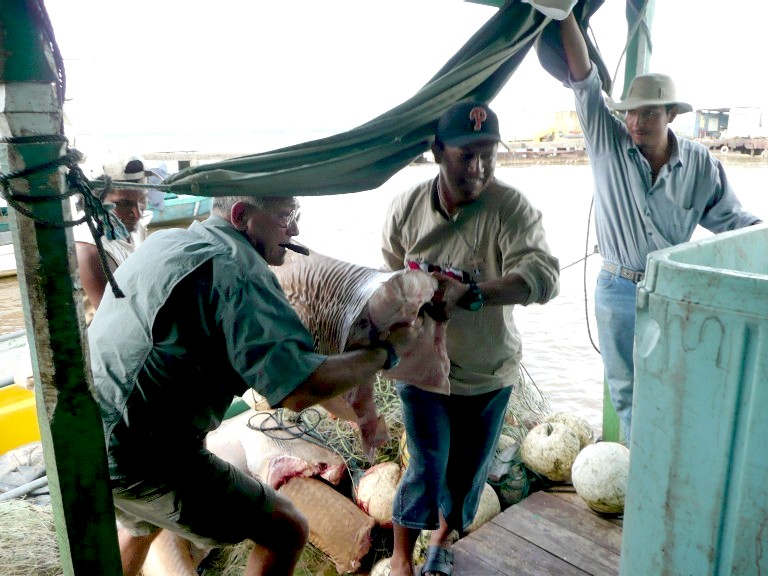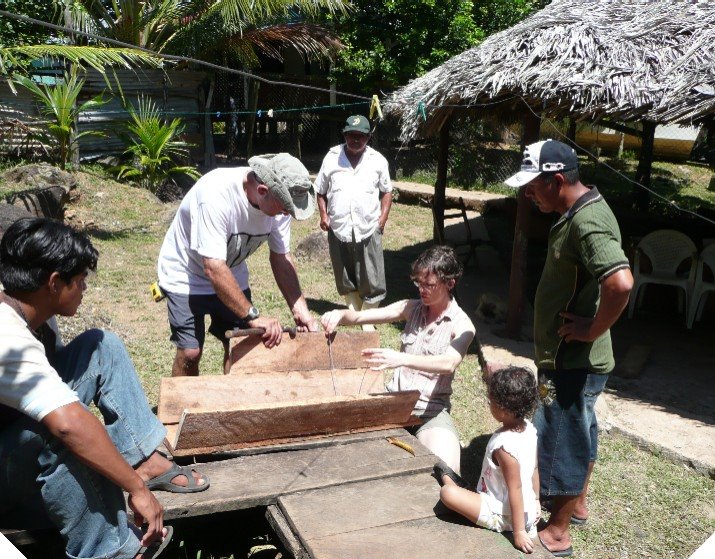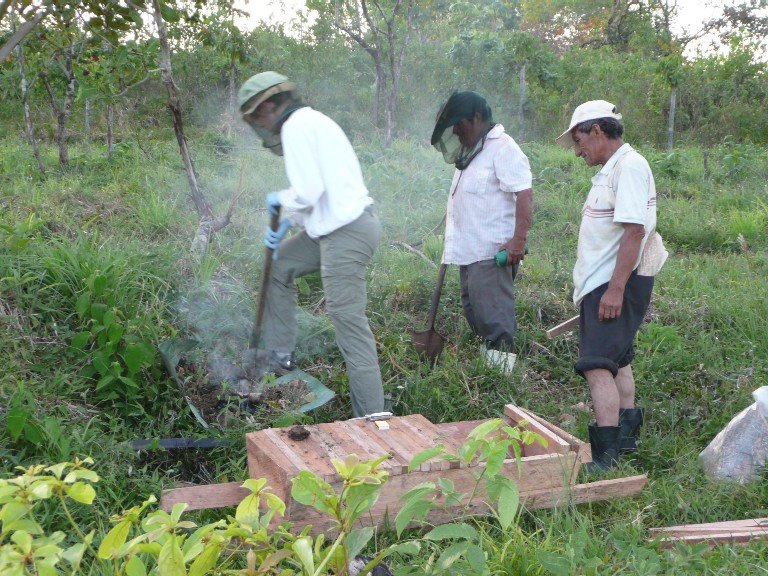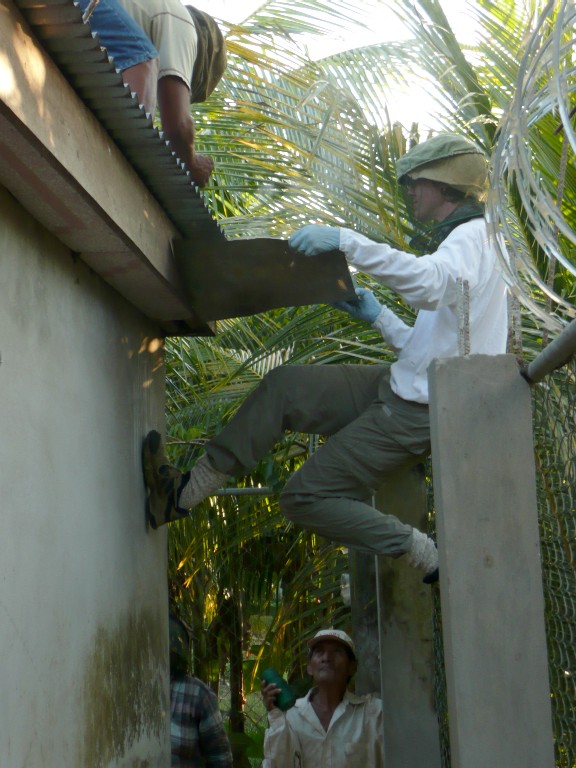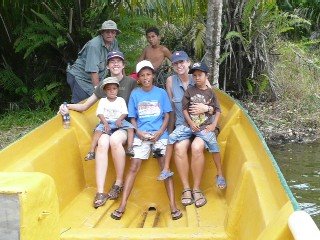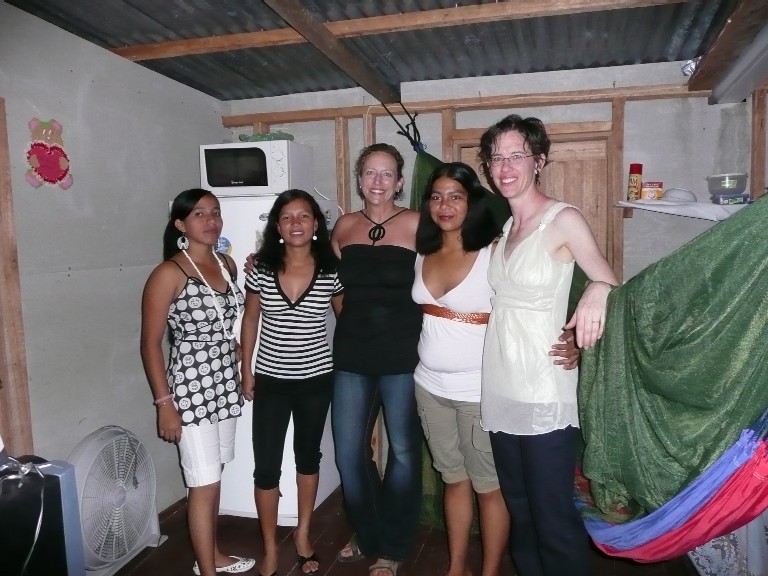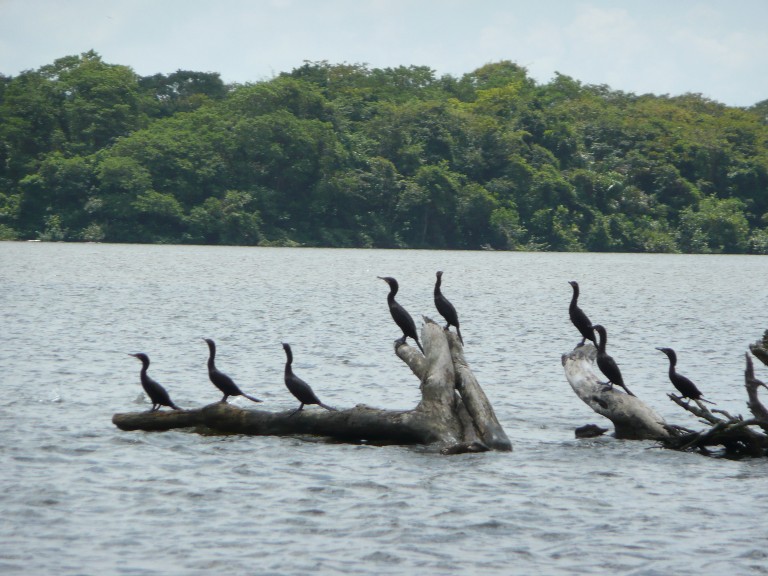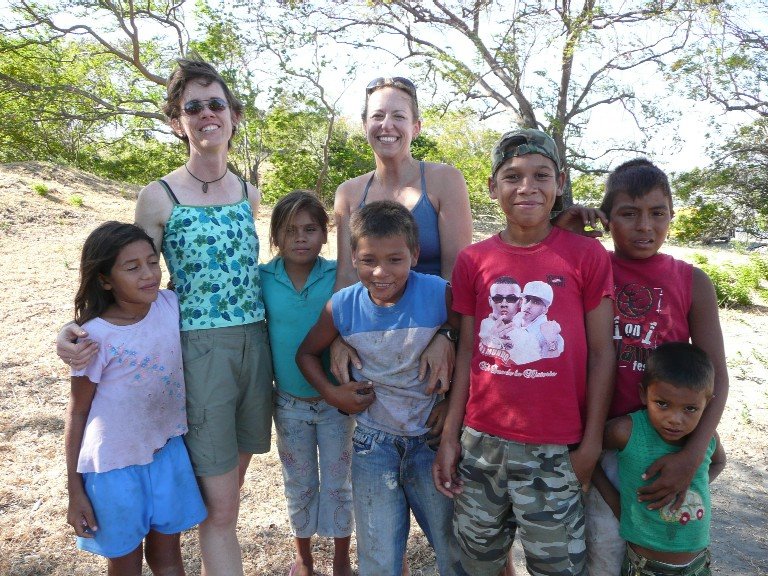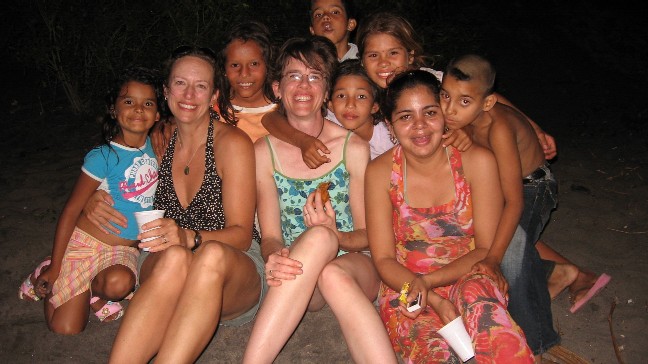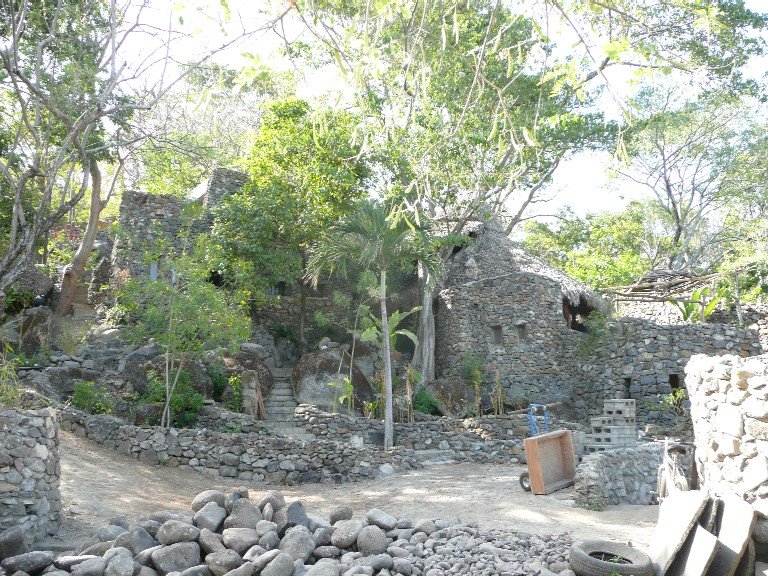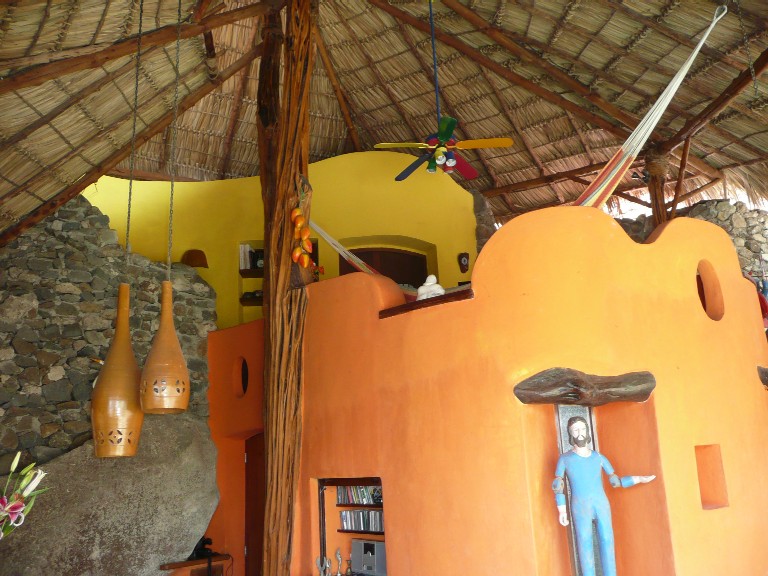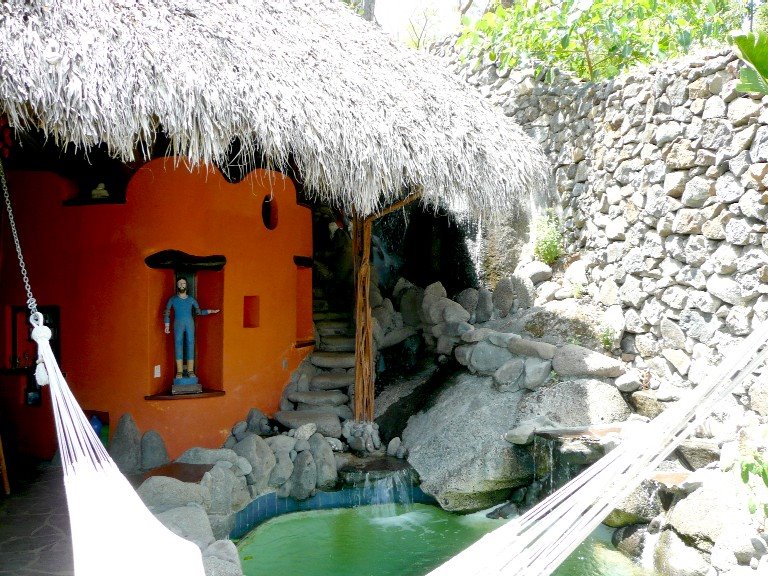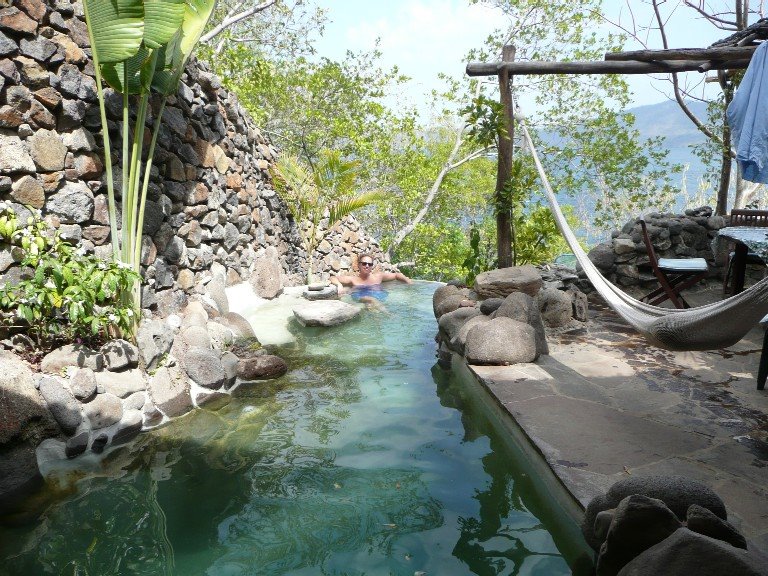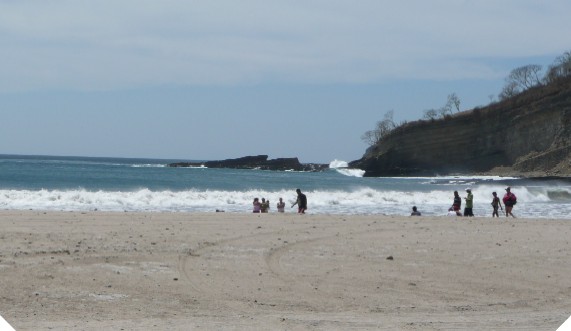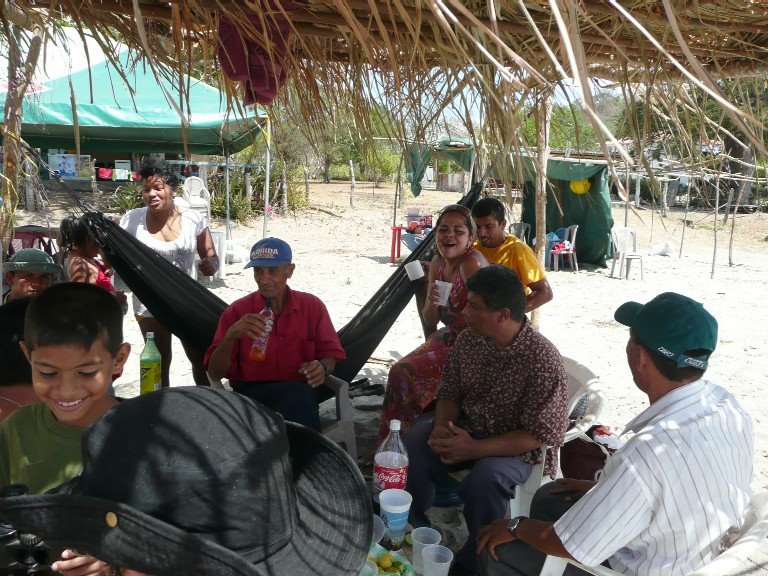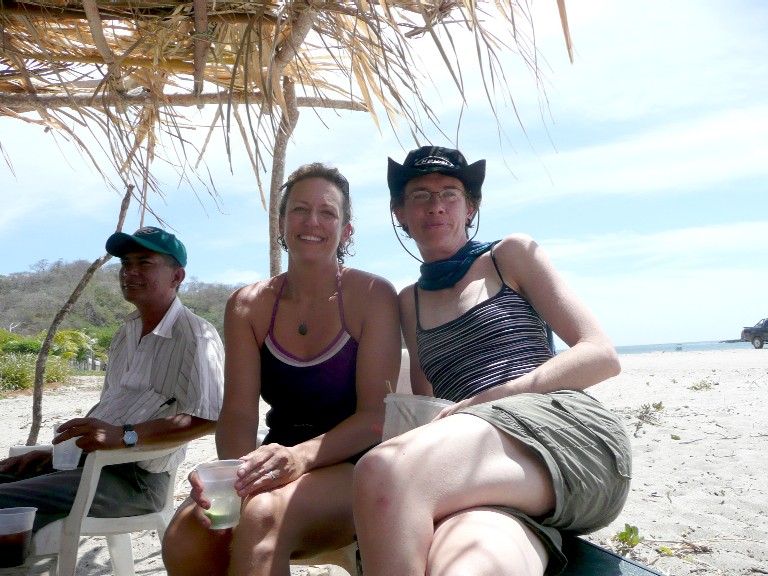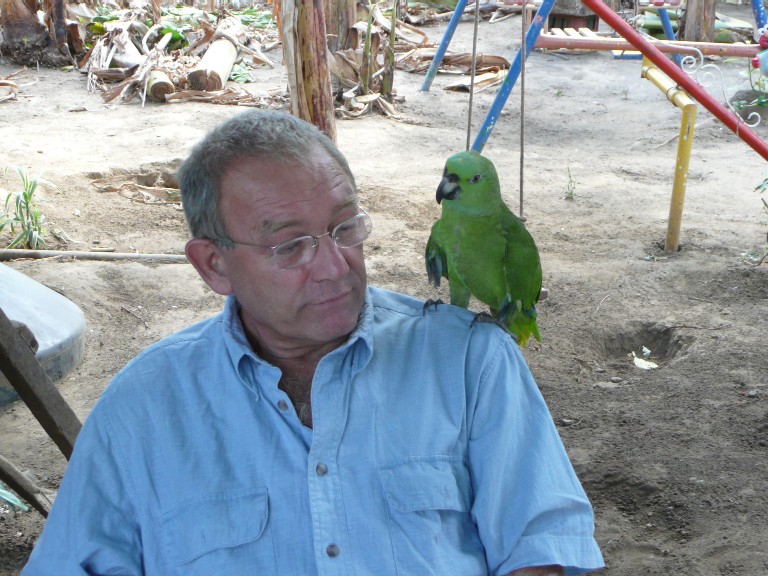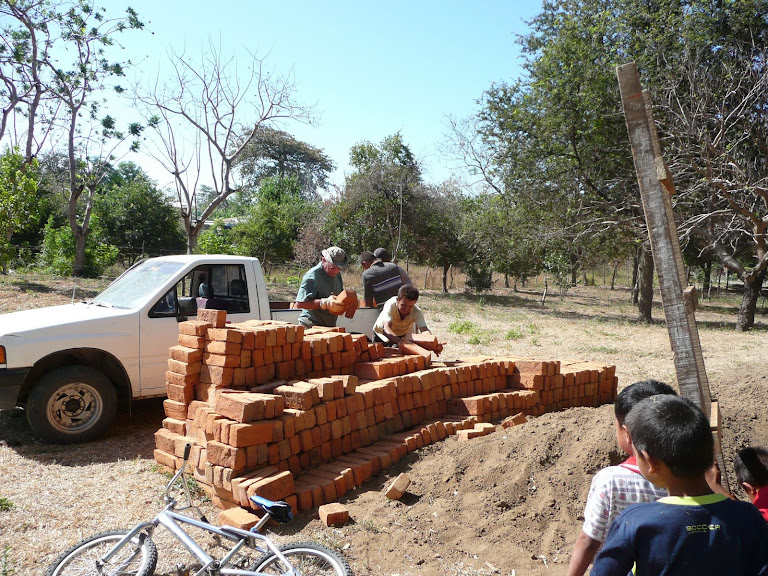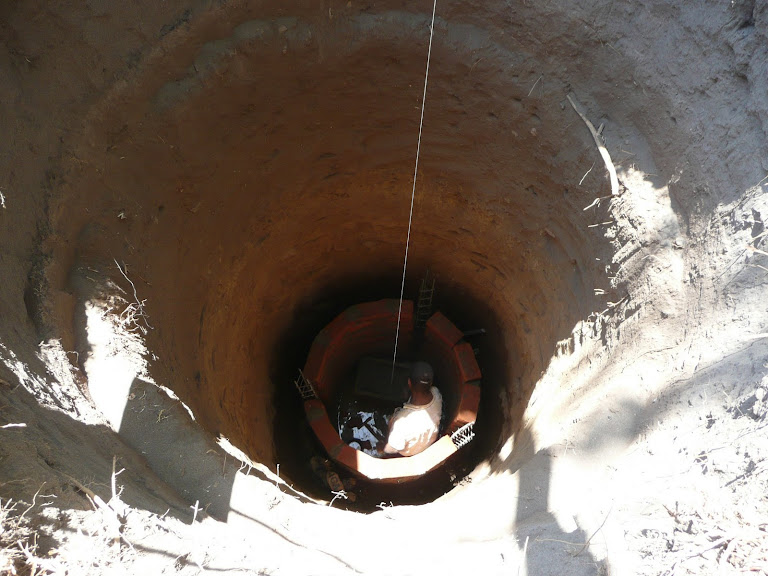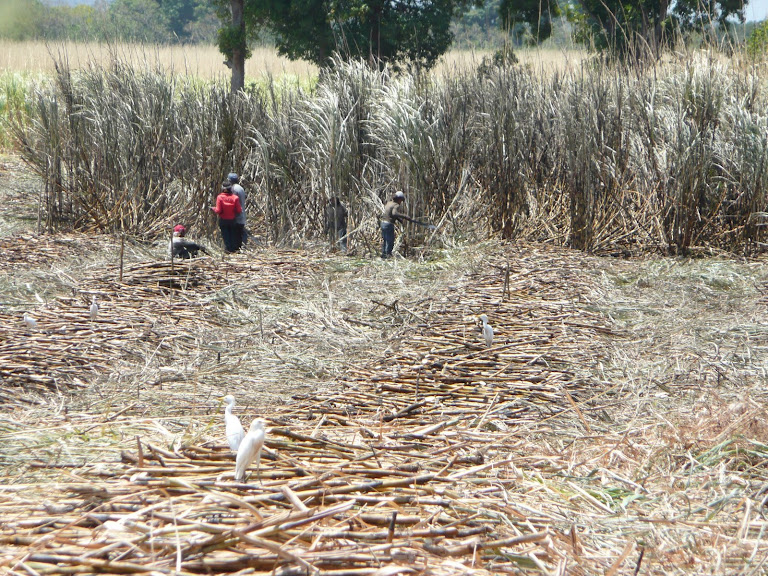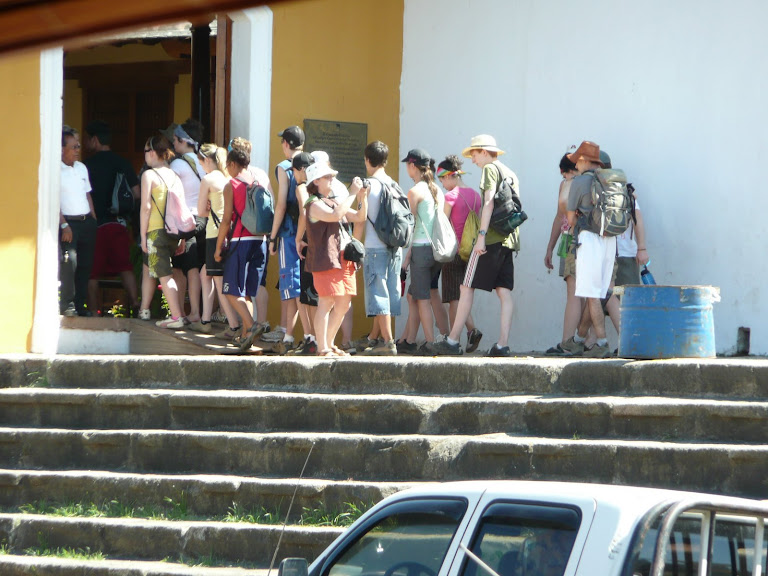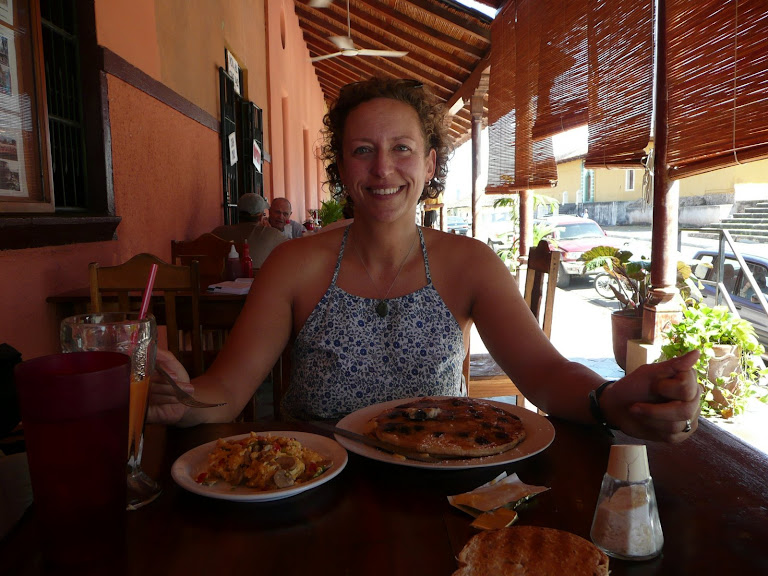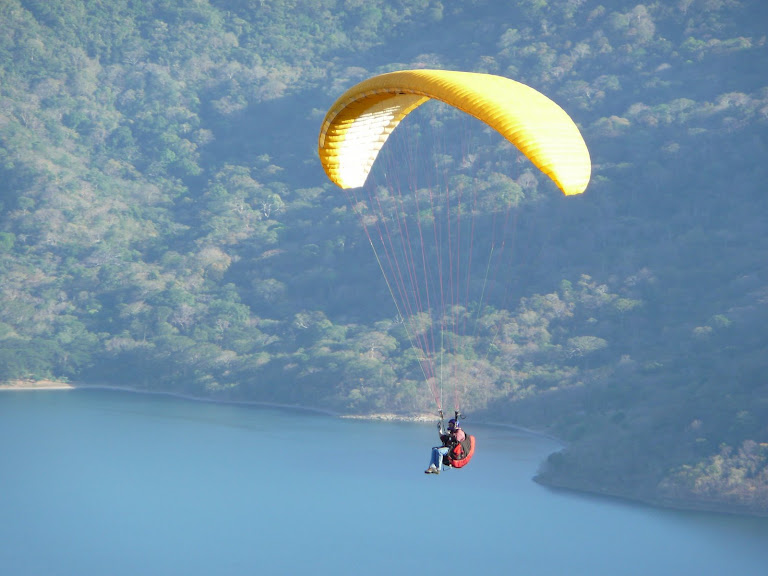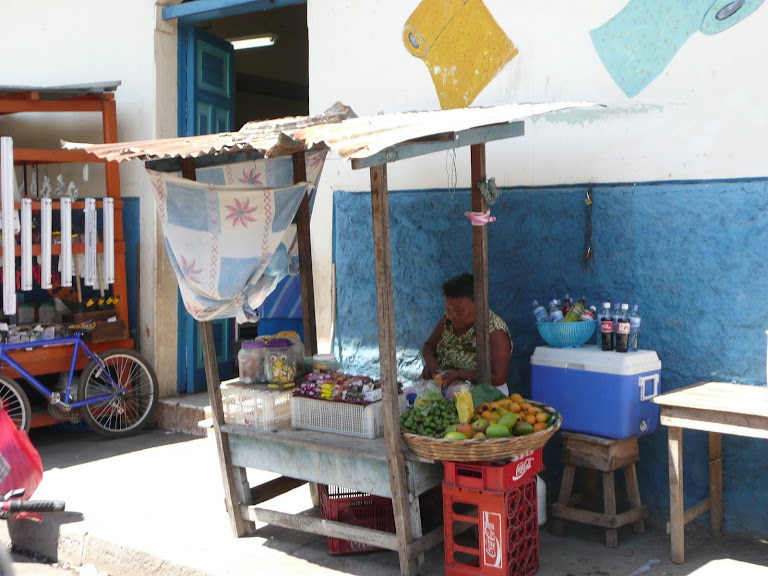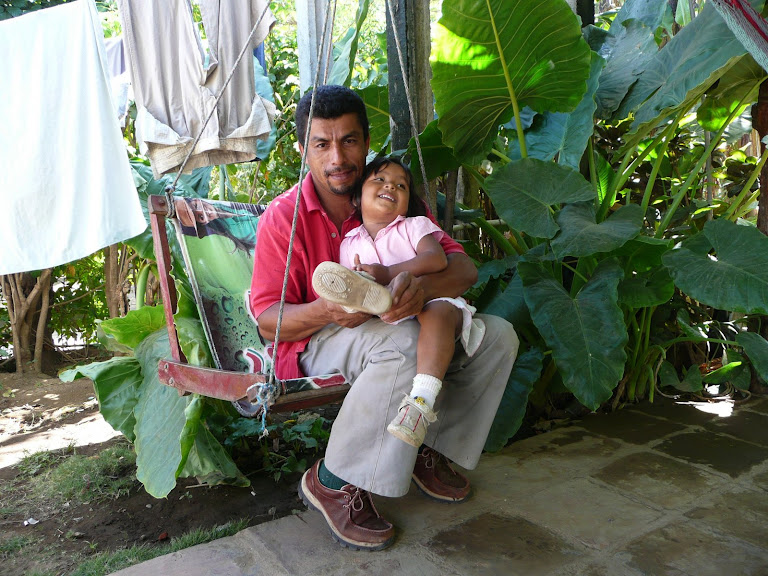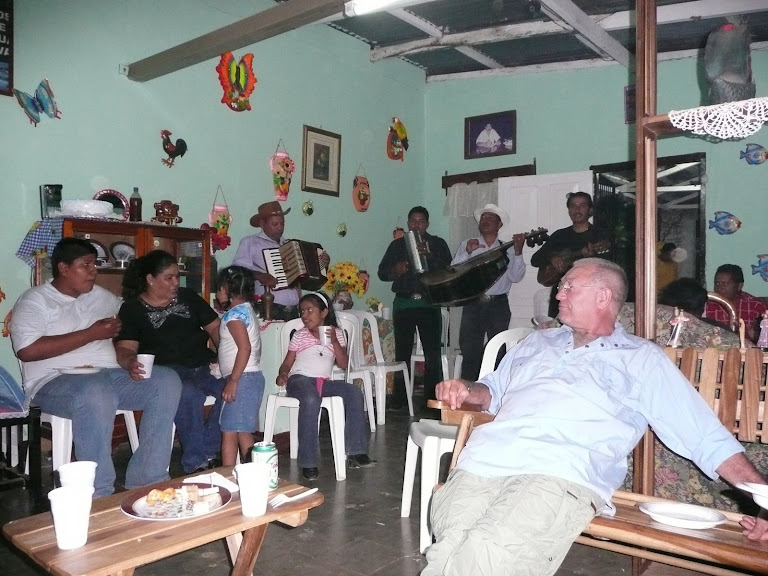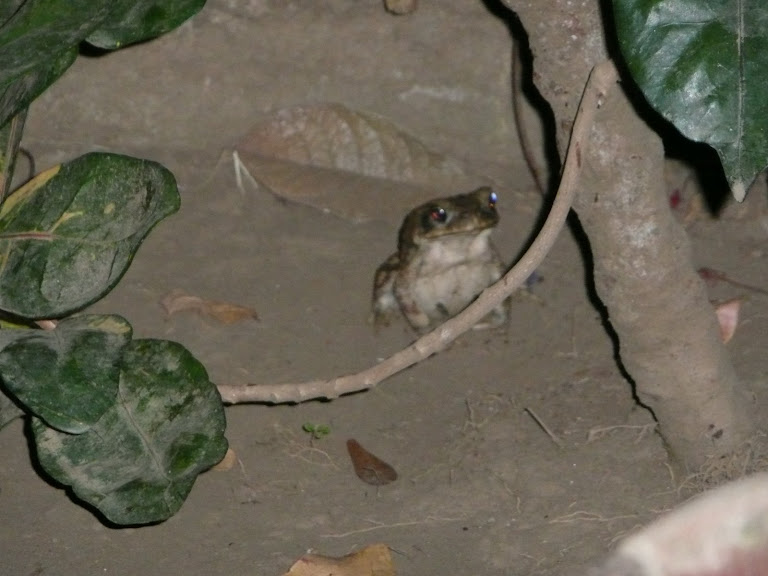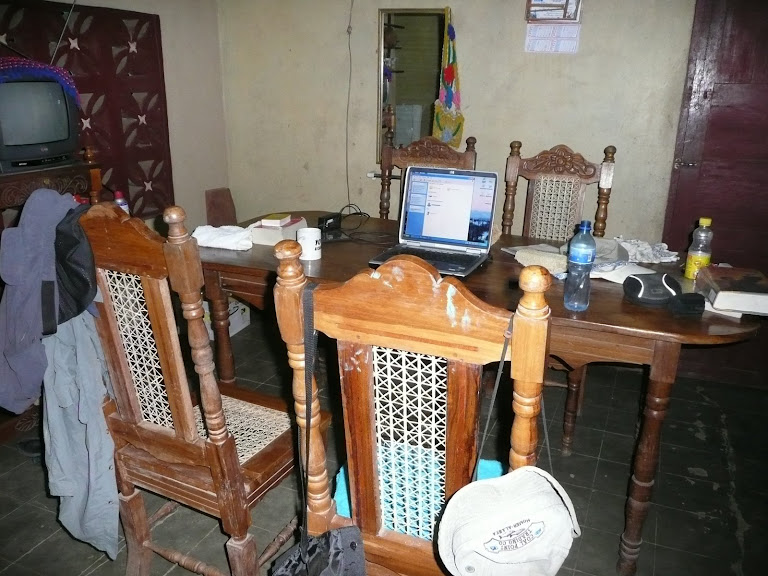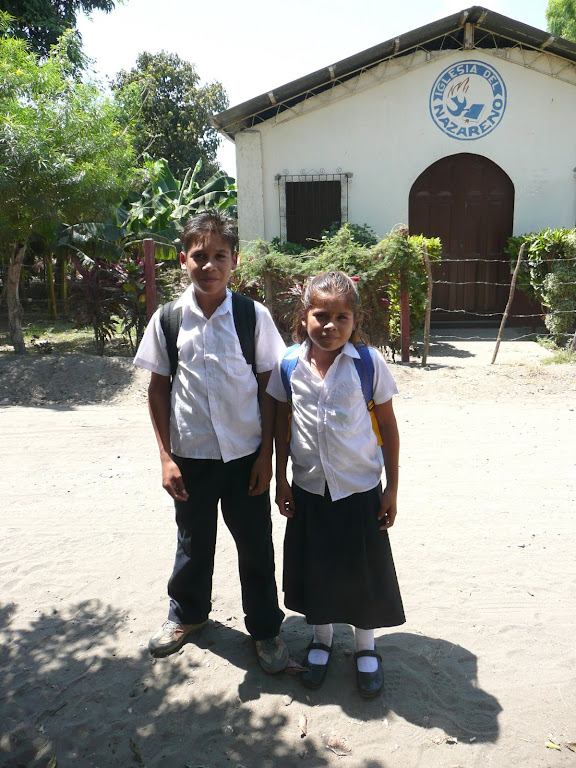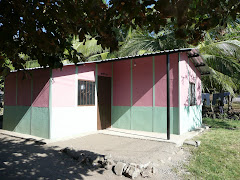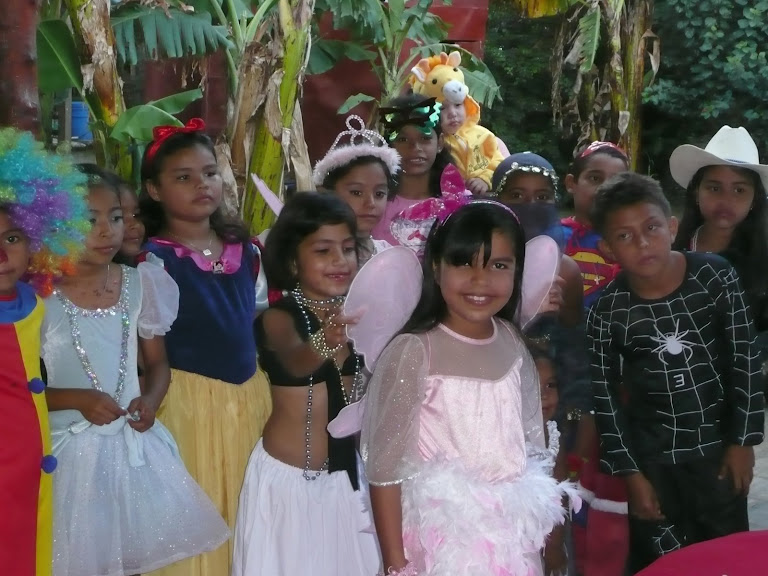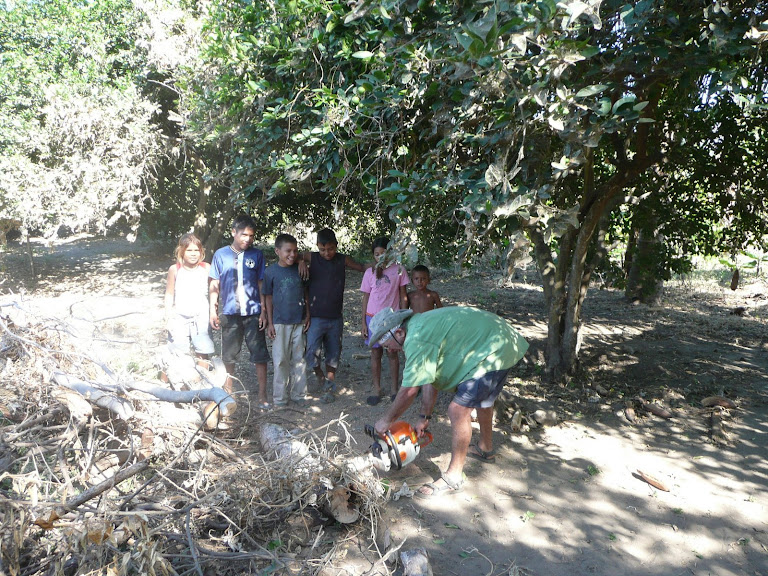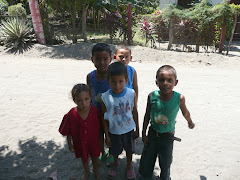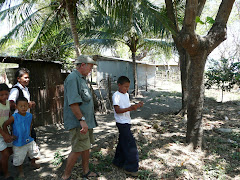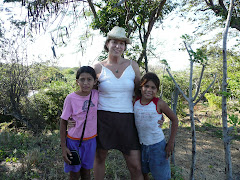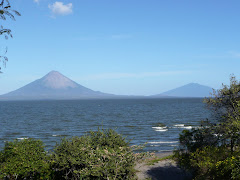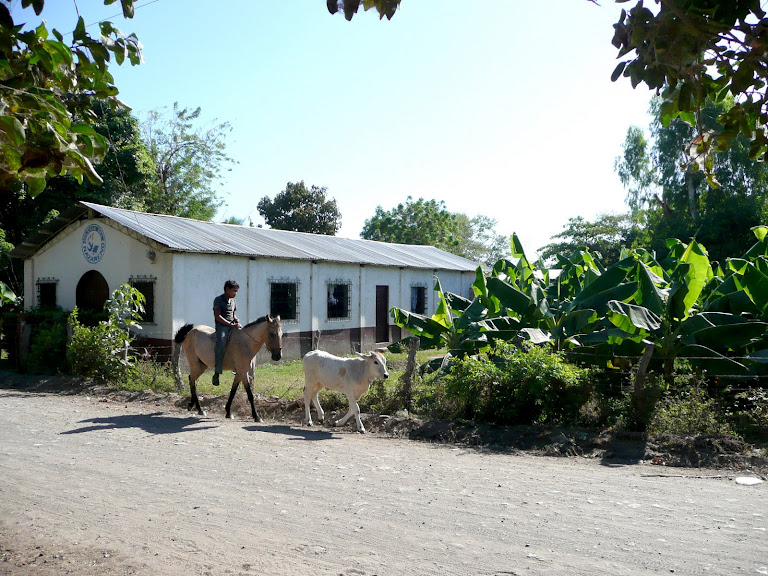Time is running out. Three weeks left, and much to do. We finally managed to locate the Saltillo-style tiles for the floors, purchased them, and had them delivered (well, as far as Edwin's place. Then two very full pickup trips out to our house, brazenly using child labor to load and unload). Pat began prepping the floor yesterday, and the actual laying begins imminently. This is exciting not only because it's our new floor, but also as it represents more or less the only real progress we've managed this trip, other than the well. Pat is optimistic he will also have time to close the place in (it's now open all along the roof-line in typical Nica fashion), which ideally will keep the place from once again becoming a safe and pleasant harbor for every wee flying beastie in SW Nicaragua, not to mention the scorpions, geckos, spiders, and snakes that also set up residence last time we left. The guy we bought the tiles from, Rodolfo, was a bit of a character. Like the tiles, he comes originally from Ocotal, up in the north, from a once wealthy coffee plantation owning family. Then came the revolution, their lands were redistributed to the local farmers, and he headed off to university in Mexico (the rest of his family moved to Managua). He married a Mexican girl, equally white and wealthy, and now divides his year between the two countries. We noticed a Land Cruiser jeep, identical to ours, parked out back, and Pat asked him about it (he spoke excellent English). Turns out, it's a '77, and he's the original owner. The family also had the Ocotal Toyota dealership for many years, and he still has the shop manuals for every vehicle made up to the late 80's. He showed us a picture of a very 70's-looking young man, curly dark hair and droopy mustache, leaning against the hood, holding an AK-47. Yep, Rodolfo, age 17, a few months before heading off to Mexico. Later on, the Jeep went missing, and friends reported seeing it driven by soldiers from the National Army (enemies of the Sandinistas) toward Honduras. His mother went up there, found the jeep, slipped inside, and drove it home, where it sat out the rest of the civil war under a mound of tarps. Exciting stuff.
We went back up to the Laguna a last time to attend Etienne's fiesta. It seemed to go off as he'd hoped, with all the Harvard grads (it was a 40 yr. reunion) suitably impressed, happily sipping their drinks and lolling about in the pool. I met a few interesting people, including a woman called Geralyn who is down here working for Opportunities International. This is a 35 year+ org. similar to Kiva, and based on the Yunis principle of small loans, primarily to women. They are branching out a bit, however, and planning to start building high schools in rural areas, utilizing a sort of voc-ed, hands-on, real-life applicable model, and have selected Rivas as their first location. I immediately began advocating for Buenos Aires, as we have schools only to the 8th grade, and she agreed to come down and take a look. They want to emphasize agriculture and tourism, the two strengths of this part of the country. We'll see where it all goes, but it definitely looks like a project we could get involved in, one way or another.
Back down here in Rivas, we had the chance observe the mind-boggling inefficiency of the Rivas hospital first hand, after a kid slammed into the jeep on a bike. We were just trundling through town on a main road, at maybe 20 mph in rush hour traffic, when a blur through Pat's side window caught my attention. Before I could say anything, the blur transformed itself into a bicycle, flying out of a side street and completely refraining from either turning or stopping, choosing instead to plow directly into our left front bumper. There was the proverbial 'sickening thud', followed by the sight of the boy flying off the bike and landing just in front of the now frozen jeep. We both leapt out, hearts in mouths, to find the boy—now more clearly visible as a young man (he turned out to be 18) slowly getting up and limping to the curb. In just a few seconds a large crowd had gathered, and to my relief, several of them, who must have witnessed the whole thing, began berating the kid, asking him what the hell he'd been thinking, etc. Pat palpated his arms and legs, ascertaining nothing was broken, but concerns about internal injuries impelled us to take him to the hospital (where, it should be noted, he did NOT want to go, and only grudgingly agreed to accompany us at the urging of his friend and several bystanders). As we were pulling away, a pedal taxi went by and yelled, "Lucky bastard—now you'll get some money!" causing the kid to blush furiously, much to his credit. Anyway, we arrived at the hospital at 5:15pm, and while there were a few people milling about the waiting area, and we could make out sounds and movements through the curtains covering the glass doors to the examination area, it was a full 30 minutes before an old woman shuffled out and asked the boy if he had his admittance papers. When he said no, she said, "Oh, well, without them, you'll be here all day and night!" to which I replied, "No one has been out here to take his information—could you please find someone?" She stared at me for a minute with an expression much like mine would have been had the dying plant in the corner suddenly proposed the idea, then nodded and shuffled back inside. Another half hour went by. Finally a younger woman came out and beckoned him over. On what appeared to be a piece of scrap paper, she jotted down his name, address, age, and complaint (he said he's fallen off his bike) with a pencil stub, then told him to go inside and wait. In the 45 minutes that followed, I chatted with his friend, who'd been riding behind him, and who happily told me he had neither brakes nor particularly advanced riding skills. "He's always getting into accidents!" This statement was later borne out when we eventually pulled up to his house and just before we stopped, the boy, Juan, leaned forward and in a panicky whisper, pleaded with us not to say anything about anything to his mother, please!
Someone in a white coat pronounced him bruised but otherwise undamaged, and gave him four or five prescriptions for assorted painkillers and antibiotics. We filled them for him—I think it came to just over $3 for everything--then drove him home. Imagining how much worse it all could have been kept us preoccupied for days…even after various Nica friends told us it was Juan who had been lucky...apparently if we had been Nicas, we'd have gotten out, ascertained that he wasn't dead or severely injured, yelled at him for being careless, and driven off into the sunset, no doubt complaining loudly about being inconvenienced by riff raff.
Oh, the fuel strike has been "resolved", though I use the term loosely. From what I can understand, the Ortega government agreed to a price reduction of $1.30/gal. for diesel, and around $. 45/gal. for gas, but only for licensed public transportation drivers, such as busses and certain taxis. To offset the loss, fuel prices for the rest of the population have been steadily increasing all week, roughly $.05/day, so that as I write, a gallon of diesel is going for approximately $6.15/gal. and climbing. As you might imagine, people are not happy about this, and for the first time, we have been seeing the formerly unimaginable: posters of Daniel (Ortega) are starting to be vandalized. We passed one the other day on which was scrawled "Ignorant Dictator", and yet others in Granada where his face had been blacked out. All of this has made it increasingly difficult for all the Sandinista mayors, many of whom are up for re-election this fall, to campaign effectively. It may take more than free pink hats this time…last week in Buenos Aires, the local candidate gave away an entire bicycle!
Speaking of fuel, we had our own close encounter—with a kerosene-based mixture used by the city to fumigate before and during every rainy season. Basically, a guy in a GhostBusters get up, trudging from house to house and blasting this acrid poison into every nook and cranny. We had our first experience last spring, early one morning, still half-asleep, when we heard voices, and before we had time to react, our bedroom door burst open and we were coated with a blast of slick smoky spray. Pat yelled, I dove under the sheet, the door slammed shut, and we were left there wondering what the f**k just happened. At least this year, we were up and about, so when he showed up, we asked him not to spray our room. He did the rest of the house, resulting in a surprising number of melodramatic cockroach deaths throughout the morning, but no apparent reduction in either mosquitoes or ants, our two main pests.
Finally, a run-in with a bent traffic cop illustrated how far we've come, both in terms of experience and language acquisition, since our first experience soon after our arrival back in Feb. '07. We were waiting to turn left at a T-junction about 40 miles N. of Rivas, when Pat spotted a cop across the way. At first he just glanced at us and looked away, but as a line of cars forced us to wait to make our turn, he glanced again and this time realized we were not quite locals. Pat said, "He's going to wave us over." And sure enough, as we pulled out to turn, the little day-glo baton began twitching, and we slowed to a stop on the shoulder. He asked for our documents, now kept in a small Ziploc baggy against dust and moisture, and after a cursory glance, began telling us we didn't have the right circulation card for our plates. Well yeah, we know that, there are no plates available in Nicaragua at the moment, so every 90 days I have to go stand in line at the transportation desk in the Rivas Police Station so they can stamp this temporary circulation and tell me to be patient a while longer. Since being pulled over for document checks is a frequent affair here, we've shown this paper to probably a dozen cops, every one of whom has wished us a nice trip and sent us on our way. Until now. So he starts getting out his book as if to write us up, and Pat gets angry, which makes the cop angry, so I get out asking him to show me what exactly is wrong with our plates, and he starts again about us needing the green card, and I launch into a polite but firm explanation of our situation, pointing out that we received the temporary card from a cop just like him, and that we've shown it to many other cops, just like him, and we are certain everything is in order, but if he has a problem, maybe we could call the police station, and if he just wants to give me his name…We're free to go? Why, thank you, sir. ¡Tenga un buen dia!
Wednesday, May 28, 2008
Wednesday, May 14, 2008
May 14, 2008
May 14, 2008
Free at last, free at last…after weeks up at the Laguna de Apoyo (6 for Pat; 3 for me), working our respective asses off, we've been liberated by the 'Belgian Vortex', our new name for Etienne. All in all, it was a good thing we did; we helped him out, moved him closer to the vague concept he has of "completion", and made the place presentable for his blowout fiesta Sun. May 18th. But man, we were ready to leave. We are trying hard not to dwell on the fact that we've accomplished next to nothing on our own place, hoping that in the month remaining to us, we will at least get ourselves somewhat ahead.
Things are a bit unstable in the country right now, thanks to a massive transportation strike. This is the result of the bus and taxi drivers finally having had enough of the exorbitant fuel prices, as much as $5.25/gal. To put that into proportion, as it represents roughly a day's wages for the average worker, tantamount to a US citizen paying $56/gal. based on a $7/hr min. wage. Imagine that! Taxistas need ten fares to make enough for one gallon. And what makes all of this really burn is that lower fuel prices were the cornerstone of Ortega's campaign platform, and a large part of what convinced 38% of the populace to re-elect him. He had big talk about his close relationship with Chavez, and how once he was in office, he would make Nicaragua friendly to the lower echelons once again. To prove his point, he distributed thousands of free bright pink baseball caps emblazoned with "¡Tu ganás! con FSLN" (You win with the Sandinistas!), and had massive billboards erected from coast to coast and border to border, 25 feet of Daniel, fist raised, announcing that the poor of the world were about to have their day. Needless to say, with some very minor exceptions, even his most loyal followers are more than a little disenchanted at the moment. And everyone else? Blockading major roads, and as of last night, burning delivery trucks entering Managua. Adding to the frustration of the masses is the apparent disappearance of $650 million. It came from Chavez, so they say, but the government refuses to account for where it went. Rumors range from the idealistic (it was used to pay off national debts), to the cynical (it's in an offshore account awaiting Daniel's retirement), with most people simply assuming it was distributed equitably amongst his cabal, and will never be seen again.
In the meantime, we are keeping our tank filled, and traveling only in daylight hours. This second adjustment after Pat decided to run down to Granada one night from the Laguna, a trip that usually takes 20 minutes, and arrived home five hours later. The road (there's just the one) was blocked by dozens of busses, and while there were police milling about, their role seemed limited to keeping the drivers from getting too unruly. When the busses finally pulled off the road to sleep for the night, Pat drove through, only to have some drunken strike supporter lob a brick at the jeep. It missed, but irritated him since on the whole, we support the strike, and along with the rest of the country, are hoping for a speedy resolution.
One of the perks of life at Etienne's work camp was the monkeys. Variously called 'howlers', for the amazing sounds they make, or 'congos', because they are sort of black, they are very entertaining. Most afternoons, a—what? tribe? group? pride? troop?—come down into the trees above and around the pool, and frolic for a few hours. The juveniles play about, practicing their swinging and branch-grabbing skills, while the older females hunch in small groups gossiping and picking fleas off each other. One or two males keep watch, while the patriarch, a large and very grouchy beast, perches above everyone making aggressive "ooh-ooh-ooh" noises. Once in a while they get spooked and in a blur, head for more distant trees, the mothers grabbing their young and flinging them up on their backs where their tiny hands cling on for dear life as mom flies through a sea of leaves, hardly seeming to touch each branch as she passes. And then, they're back, as thought nothing had happened.
Then there are the macaws and parrot, all of whom live up near the caretakers' apartment at the top of the drive. Most of the day they doze, emit strangled squawking noises, and entertain themselves by pulling the laundry off the line. But 5-7, a.m. and p.m., is their time to shine. They talk, sing, scream, fight, holler, whistle, bark, cough, and basically generate enough noise to make the idea of macaw fricassee sound very appealing. One of them has a substantial vocabulary, including "I love you", Buenos dias", "Chulita" (one of the dogs—and it really messes with her to hear her name over and over), "Walter" (the caretaker, of whom the birds are all very fond), and now, thanks to my efforts, "Patrick", but only when prompted (I repeat "Patrick" 27 times and eventually get a weak "Pat-tik" in return.)
The man responsible for our entering Etienne's orbit in the first place showed up with his wife a few days ago. His mother and mine are in Florida Pen Women together, and I've become friends with her as well (she's 93, and while her mind slips occasionally, she's still an amazing person.) When she learned we were to be spending time in Nicaragua, she insisted I get in touch with her son (David, who lives in Santa Cruz, CA), and from him, connect with one of his oldest friends who has lived down here for over 35 years. I did so, and now that I've met him and Clea (who's also know Etienne for years—he introduced the two of them!), and like them very much, I can hardly bring myself to blame them for encouraging our acquaintance with their megalomaniacal Belgian buddy. While Pat was finishing things up the other day, I went off sight-seeing with them around Masaya, a city south of Managua. We first hit the Artisan's Market, which I'd heard a lot about but we'd never gotten around to visiting. I'd envisioned typical Latin American mercado insanity, but in fact, it's clearly designed for the tourist crowd; clean, organized, quiet, and very pleasant, if a bit too sterile for my taste. Still, everything made or grown in Nicaragua (as well as Honduras, El Salvador, and Guatemala) is on display, from hammocks to headboards, cigars to ceramics. It's a bit of a maze, however, and Clea and I spent nearly an hour trying to find our way back to the one hammock vendor out of dozens that had the exact model she wanted. Mission accomplished, we found David, grabbed some lunch, and headed for the Masaya Volcano National Park.
Nicaragua is not called the "Land of Lakes and Volcanoes" for nothing; there are dozens of the craggy cones running the length of the country, many still active. Masaya is one of those, but due to a complete lack of concern for potential lawsuits, we were able to drive extremely close to the rim, and peer down into the massive smoldering crater. It was impressive, and bore a surprising resemblance to the volcano we saw on the Big Island of Hawaii a few years back. David reliably informed me that most volcanic zones looked alike, resulting in some discussion with Clea who pointed out this rule did not apply to Italy… The park had a sprawling and extremely informative visitor center, complete with scale-size models of all the volcanoes in the country, and detailed info on them all. There were samples of all the plants known to grow anywhere nearby, taxidermied animals, including a rather mangy miniature deer that bore a disconcerting likeness to Dan Quayle, and samples of the various types of volcanic rock, with their Hawaiian names proudly displayed. David, who spent the first 18 years of his life in Panama, followed by stints in the Dominican Rep., and Puerto Rico, and is very partial to these sorts of countries, said without a hint of malice, "There are definite signs of intelligence in this country", after being completely bowled over by the level of thought, detail, and scientific awareness poured into the displays. I think he was more impressed by Masaya than by the much more sophisticated and elegant, tourism-friendly city of Granada…
Finally, the rains are back. We had a deluge of such intensity last Saturday that all of Rivas lost power for 36 hours, and overnight, trees found their leaves and blossoms, dormant since late January. We hope this will not impede our progress on the house in the time we have left (since most of the work involves digging holes in the ground and burying things, a lot of rain could potentially make life difficult). I'll keep you posted.
Free at last, free at last…after weeks up at the Laguna de Apoyo (6 for Pat; 3 for me), working our respective asses off, we've been liberated by the 'Belgian Vortex', our new name for Etienne. All in all, it was a good thing we did; we helped him out, moved him closer to the vague concept he has of "completion", and made the place presentable for his blowout fiesta Sun. May 18th. But man, we were ready to leave. We are trying hard not to dwell on the fact that we've accomplished next to nothing on our own place, hoping that in the month remaining to us, we will at least get ourselves somewhat ahead.
Things are a bit unstable in the country right now, thanks to a massive transportation strike. This is the result of the bus and taxi drivers finally having had enough of the exorbitant fuel prices, as much as $5.25/gal. To put that into proportion, as it represents roughly a day's wages for the average worker, tantamount to a US citizen paying $56/gal. based on a $7/hr min. wage. Imagine that! Taxistas need ten fares to make enough for one gallon. And what makes all of this really burn is that lower fuel prices were the cornerstone of Ortega's campaign platform, and a large part of what convinced 38% of the populace to re-elect him. He had big talk about his close relationship with Chavez, and how once he was in office, he would make Nicaragua friendly to the lower echelons once again. To prove his point, he distributed thousands of free bright pink baseball caps emblazoned with "¡Tu ganás! con FSLN" (You win with the Sandinistas!), and had massive billboards erected from coast to coast and border to border, 25 feet of Daniel, fist raised, announcing that the poor of the world were about to have their day. Needless to say, with some very minor exceptions, even his most loyal followers are more than a little disenchanted at the moment. And everyone else? Blockading major roads, and as of last night, burning delivery trucks entering Managua. Adding to the frustration of the masses is the apparent disappearance of $650 million. It came from Chavez, so they say, but the government refuses to account for where it went. Rumors range from the idealistic (it was used to pay off national debts), to the cynical (it's in an offshore account awaiting Daniel's retirement), with most people simply assuming it was distributed equitably amongst his cabal, and will never be seen again.
In the meantime, we are keeping our tank filled, and traveling only in daylight hours. This second adjustment after Pat decided to run down to Granada one night from the Laguna, a trip that usually takes 20 minutes, and arrived home five hours later. The road (there's just the one) was blocked by dozens of busses, and while there were police milling about, their role seemed limited to keeping the drivers from getting too unruly. When the busses finally pulled off the road to sleep for the night, Pat drove through, only to have some drunken strike supporter lob a brick at the jeep. It missed, but irritated him since on the whole, we support the strike, and along with the rest of the country, are hoping for a speedy resolution.
One of the perks of life at Etienne's work camp was the monkeys. Variously called 'howlers', for the amazing sounds they make, or 'congos', because they are sort of black, they are very entertaining. Most afternoons, a—what? tribe? group? pride? troop?—come down into the trees above and around the pool, and frolic for a few hours. The juveniles play about, practicing their swinging and branch-grabbing skills, while the older females hunch in small groups gossiping and picking fleas off each other. One or two males keep watch, while the patriarch, a large and very grouchy beast, perches above everyone making aggressive "ooh-ooh-ooh" noises. Once in a while they get spooked and in a blur, head for more distant trees, the mothers grabbing their young and flinging them up on their backs where their tiny hands cling on for dear life as mom flies through a sea of leaves, hardly seeming to touch each branch as she passes. And then, they're back, as thought nothing had happened.
Then there are the macaws and parrot, all of whom live up near the caretakers' apartment at the top of the drive. Most of the day they doze, emit strangled squawking noises, and entertain themselves by pulling the laundry off the line. But 5-7, a.m. and p.m., is their time to shine. They talk, sing, scream, fight, holler, whistle, bark, cough, and basically generate enough noise to make the idea of macaw fricassee sound very appealing. One of them has a substantial vocabulary, including "I love you", Buenos dias", "Chulita" (one of the dogs—and it really messes with her to hear her name over and over), "Walter" (the caretaker, of whom the birds are all very fond), and now, thanks to my efforts, "Patrick", but only when prompted (I repeat "Patrick" 27 times and eventually get a weak "Pat-tik" in return.)
The man responsible for our entering Etienne's orbit in the first place showed up with his wife a few days ago. His mother and mine are in Florida Pen Women together, and I've become friends with her as well (she's 93, and while her mind slips occasionally, she's still an amazing person.) When she learned we were to be spending time in Nicaragua, she insisted I get in touch with her son (David, who lives in Santa Cruz, CA), and from him, connect with one of his oldest friends who has lived down here for over 35 years. I did so, and now that I've met him and Clea (who's also know Etienne for years—he introduced the two of them!), and like them very much, I can hardly bring myself to blame them for encouraging our acquaintance with their megalomaniacal Belgian buddy. While Pat was finishing things up the other day, I went off sight-seeing with them around Masaya, a city south of Managua. We first hit the Artisan's Market, which I'd heard a lot about but we'd never gotten around to visiting. I'd envisioned typical Latin American mercado insanity, but in fact, it's clearly designed for the tourist crowd; clean, organized, quiet, and very pleasant, if a bit too sterile for my taste. Still, everything made or grown in Nicaragua (as well as Honduras, El Salvador, and Guatemala) is on display, from hammocks to headboards, cigars to ceramics. It's a bit of a maze, however, and Clea and I spent nearly an hour trying to find our way back to the one hammock vendor out of dozens that had the exact model she wanted. Mission accomplished, we found David, grabbed some lunch, and headed for the Masaya Volcano National Park.
Nicaragua is not called the "Land of Lakes and Volcanoes" for nothing; there are dozens of the craggy cones running the length of the country, many still active. Masaya is one of those, but due to a complete lack of concern for potential lawsuits, we were able to drive extremely close to the rim, and peer down into the massive smoldering crater. It was impressive, and bore a surprising resemblance to the volcano we saw on the Big Island of Hawaii a few years back. David reliably informed me that most volcanic zones looked alike, resulting in some discussion with Clea who pointed out this rule did not apply to Italy… The park had a sprawling and extremely informative visitor center, complete with scale-size models of all the volcanoes in the country, and detailed info on them all. There were samples of all the plants known to grow anywhere nearby, taxidermied animals, including a rather mangy miniature deer that bore a disconcerting likeness to Dan Quayle, and samples of the various types of volcanic rock, with their Hawaiian names proudly displayed. David, who spent the first 18 years of his life in Panama, followed by stints in the Dominican Rep., and Puerto Rico, and is very partial to these sorts of countries, said without a hint of malice, "There are definite signs of intelligence in this country", after being completely bowled over by the level of thought, detail, and scientific awareness poured into the displays. I think he was more impressed by Masaya than by the much more sophisticated and elegant, tourism-friendly city of Granada…
Finally, the rains are back. We had a deluge of such intensity last Saturday that all of Rivas lost power for 36 hours, and overnight, trees found their leaves and blossoms, dormant since late January. We hope this will not impede our progress on the house in the time we have left (since most of the work involves digging holes in the ground and burying things, a lot of rain could potentially make life difficult). I'll keep you posted.
Subscribe to:
Posts (Atom)


